


The traditional agriculture-based lifestyle of rural people saw them come together to work on each other’s fields during the harvest seasons. People would also help each other to thatch roofs or repair each other’s homes; the close-knit ties and community support systems that still exist today.
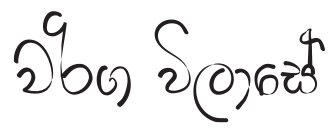
Var . ri . ga Vi . laa . se
Value Creation Report
The value creation report offers a detailed analysis of how we use our capitals to create lasting value for all our stakeholders.

At DIMO we have been relentlessly fine-tuning our value creation process and delivery for many years. Because however big we grow, the creation of value for every one of our stakeholders remains our primary purpose. Our value creation activities use inputs or contributions from our four capitals - monetised capital (which includes financial capital, property, plant and equipment), stakeholder, intellectual and environmental capital, to achieve our purpose. The efficient and productive management of our capitals and processes is what we pride ourselves upon, for therein lies the key to the efficient and continuous delivery of rising value.
In our model there are three activities that lie at the heart of our value-creating enterprise. Securing, nurturing and preserving the capitals we own while simultaneously managing the impacts of our processes upon them is the first. The second demands precision and efficiency in the management of the process of value creation, in order to maximize the value created.
The final element in our value chain is the responsible corporate citizenship that we have always prioritised from 1939 to this day, not just because we know that our stakeholders’ belief in us depends upon it but because it is the standard of governance we live by. In the end the cycle is a perfect one, in which our capitals or value stores provide inputs for the value creation activities, leading to outputs and impacts upon our capitals.
And that is how we add value to every activity we undertake, however great or small. In short, it is how we seek to leverage our core strengths, our expertise and our resources to produce a win-win result for both DIMO and every stakeholder who trusts us to deliver on every promise we make.
|
|
|
|||||||||||
|
|
|
|
|
 |
|
|||||||
|
|
 |
|
||||||||||
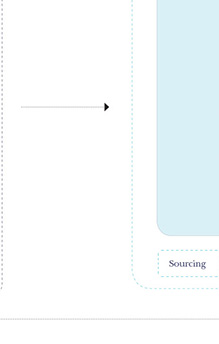 |
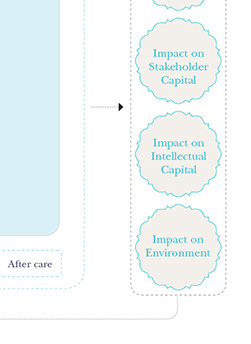 |
|
||||||||||
|
|
||||||||||||
|
|
||||||||||||
|
|
||||||||||||
|
|
|
|||||||||||
|
|
||||||||||||
|
|
||||||||||||
|
|
||||||||||||
|
|
|
|||||||||||
|
|
||||||||||||
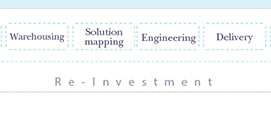 |
|
|||||||||||
 |
|
|||||||||||
|
|
|
|
|
|||||||||
|
|
|
|||||||||||
|
|
||||||||||||
|
|
|
|||||||||||
|
|
|
|
|
|
|
|
|
|
|
|
|
|

The company’s stakeholders were comprehensively identified by the Sustainability Committee, using data that was independently collected from various stakeholder groups. The criteria used to identify the stakeholders of the company were as follows:
The Group engages stakeholders on a periodic basis with a view to identifying stakeholder expectations. A table containing the frequency at which such engagement takes place and the methods of engagement is given below. Any major concern relating to sustainability identified during the stakeholder engagement process is escalated to the Board of Directors. During the year, there were no such concerns that were identified, which warranted consideration or review by the Board.
The table below illustrates how we engage with our important stakeholder groups.
|
Stakeholder |
Engagement Method |
Frequency |
|
Shareholders
capital |
|
|
|
Employees
for competitive advantage and sustainable growth |
management dialogue.
|
|
|
Customers
|
|
|
|
Business Partners
|
|
|
|
Society
|
|
|
Arising from the stakeholder engagement process, the expectations were rated, assigned and prioritised.

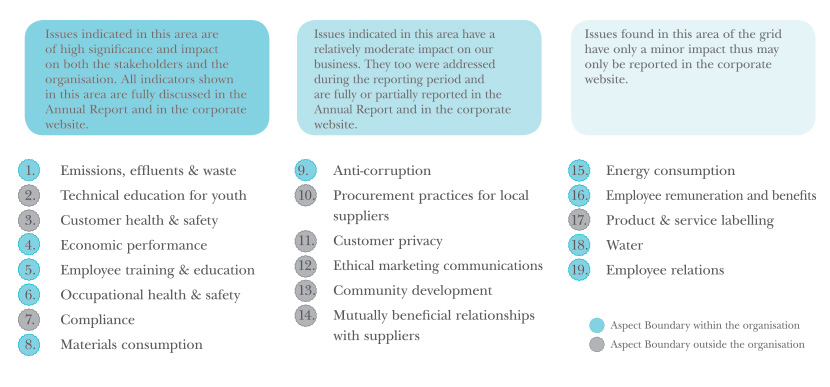
Stakeholder concerns (both positive and negative) were considered to update the material issues. The materiality analysis has been brought up-to-date by adding key inputs and replacing outdated information based on the feedback received from stakeholders. This analysis traces the issues raised, their materiality status (whether it increased, decreased, remained unchanged from the previous year, or emerged newly in the current year), and the reasons for the shift of status and the Group’s response.
|
Material aspect |
Issues raised by |
Status of Material Issues |
Possible Reason for the Shift |
Response |
|
Emissions, Effluents and Waste |
Society |
|
|
Our Environment Management System is constantly working towards minimising emission levels. |
|
Technical Education for Youth |
Society |
|
|
We will continue to facilitate external trainees to receive on the job training at no cost. |
|
Customer Health and Safety |
Customer |
|
|
We will continue to leverage the specifications and inbuilt health and safety aspects of our blue-chip product portfolio along with our own initiatives to reinforce this aspect. |
|
Employee Training and Education |
Employee |
|
|
Continuous training and development programmes conducted for the employees. |
|
Occupational Health and Safety |
Employee |
|
|
Gap Analysis for Occupational Health and Safety Standard (OHSAS) completed. |
|
Investment and Procurement Practices for Local Suppliers |
Local suppliers |
|
Suppliers are not aware of the content of supplier code prepared by the Company. |
Will be conducting awareness programs and supplier audits to educate suppliers on the supplier code of conduct |
|
Water |
Society |
|
|
Increase the percentage of recycled/reused ground water. |
|
Ethical Marketing Communications |
Customer |
|
No hindrance to society in terms of ethical marketing practices. |
Company communication policy ensures strict compliance with regulations and codes concerning ethical marketing practices. |
|
Local Communities |
Society |
|
|
A process to measure community impact precedes all relevant Company activity. |
|
Mutually Beneficial Relationships with Suppliers |
Suppliers |
|
|
Constant contact and sharing of information continues. Reports, to Principals will address expectations of Principals. |
|
Energy Consumption |
Society |
|
Reduction in energy usage due to strict energy management |
Energy saving measures are implemented across the organisation. |
|
Employee Benefits |
Employee |
|
Increasing confidence and trust employees place in Dimo. |
Dimo seeks to exceed industry levels wherever possible in delivering benefits to employees. |
 Materiality of issues increased
Materiality of issues increased  Materiality of issues decreased
Materiality of issues decreased  Materiality of issues remains same
Materiality of issues remains same  New Issues identified
New Issues identified
A review of monetised capitals and value creation activity that can be captured in monetary terms.
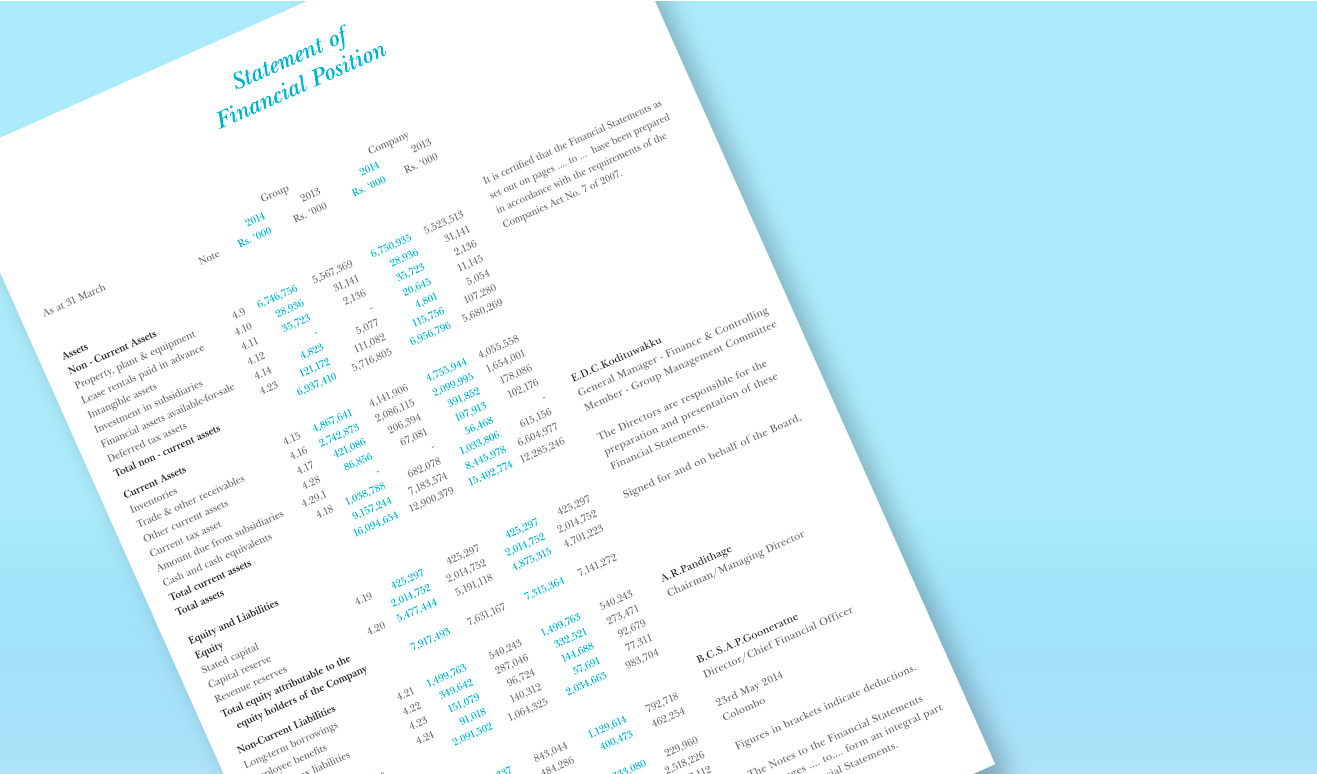
|
Aspect |
Measure |
2013/14 |
2012/13 |
2011/12 |
2010/11 |
2009/10 |
|
|
Turnover (Rs. mn) |
20,884 |
27,711 |
39,863 |
29,357 |
10,530 |
|
Profitability |
Gross profit ratio (%) |
20.87 |
15.21 |
18.23 |
20.30 |
22.70 |
|
|
Net profit ratio (%) |
1.90 |
1.70 |
6.81 |
7.20 |
2.40 |
|
Working capital management |
Current ratio (times) |
1.50 |
1.71 |
1.60 |
1.27 |
1.28 |
|
|
Quick Assets Ratio (times) |
0.70 |
0.72 |
0.36 |
0.84 |
0.78 |
|
Asset Utilization |
Asset Turnover (times) |
3.10 |
4.98 |
8.55 |
9.59 |
4.92 |
|
Investments |
Capital expenditure as percentage of total assets (%) |
8.66 |
8.50 |
6.20 |
9.90 |
7.00 |
|
Capital structure |
Debt/Equity (%) - at year end |
23.15 |
10.10 |
13.40 |
9.80 |
30.20 |
|
|
Interest cover (times) |
2.42 |
2.24 |
15.67 |
17.35 |
2.12 |
Monetised capital consists of financial capital and manufactured capital. Financial capital is the pool of funds available for DIMO to create value. Manufactured capital is made up of manufactured physical objects available to DIMO to carry out its value creating activities, represented by property, plant and equipment. For the purpose of this report, land is classified under monetised capital and not under environment capital. Monetised capitals together with inputs from the other capitals power the value creation activities. This section provides a review of monetised capitals and value creation activity, outputs and outcomes that can be captured in monetary terms.
In a challenging trading environment, the Group delivered a turnover of Rs. 20.8 bn through the prudent management of its value creation process. The Group recorded a profit before tax of Rs.512.8 mn and earnings per share of Rs.44.34.
The Company continued with the planned investments to expand capacity. An amount of Rs. 1,393.5 mn. (Rs. 1,094.4 mn in 2012/13) was incurred on acquisition of property, plant & equipment (PP&E) during the year. Of this, Rs. 1,223 mn was spent on the construction of the Mercedes Centre, the single largest investment planned. Other items include acquisition of plant and machinery amounting to Rs.14.4 mn and computer software amounting to Rs.40.3 mn.
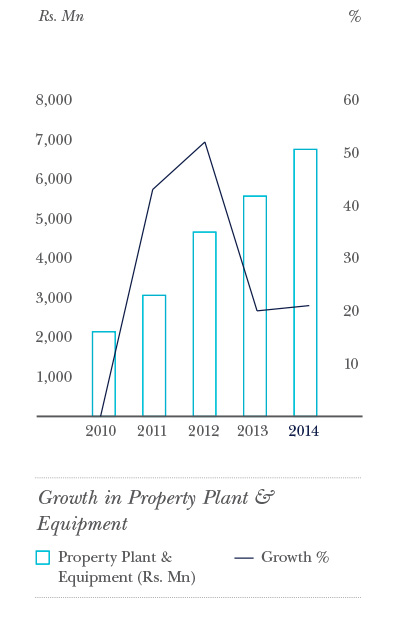
The Group turnover decreased by 25% to Rs. 20.8 bn when compared with last year’s turnover of Rs. 27.7 bn. A 36% reduction in the turnover of the vehicle –sales segment was the main reason for the decrease.
The gross profit margin increased from 15.21% to 20.87% in 2013/14. Profit before taxation shows a 4.7% increase compared to the last year’s figure of Rs. 490 mn. The increase in gross profit and reduction in finance cost collectively triggered the increase in the Group profit before tax.
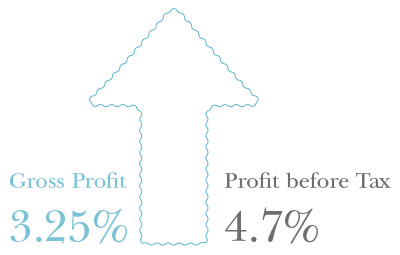
Earnings before interest and tax (EBIT) for the year reduced to Rs.874.5 mn from Rs. 885.5 mn the previous year while net profit after tax decreased to Rs.393.5mn from Rs.454 mn. Following suit, earnings per share (EPS) reduced to Rs.44.34 from Rs. 51.16. The computation of EPS is given in Note 4.7 to the Financial Statements.
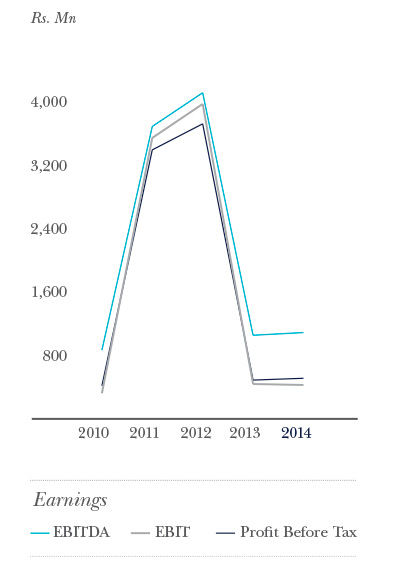
Finance cost, which is usually a significant component in the cost structure, reduced by 31% to Rs.437 mn from Rs.636 mn in the previous year. This was mainly due to the reduction of interest rates.
The increase in borrowings is mainly attributable to the financial investment in the New Mercedes-Benz Centre. During its construction period the finance cost relating to financing of the investment is capitalised as required by LKAS 23 - Borrowing Costs.
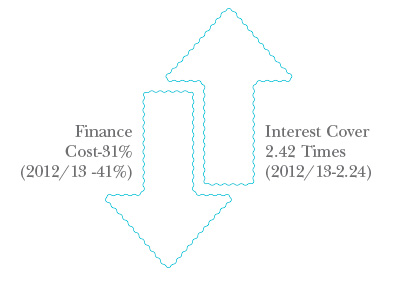
The income tax expense for the year was Rs.119.3 mn (Rs.35.9 mn – 2012/13). The rate of income tax applicable to the Company and subsidiaries was 28%, whilst the rate of income tax applicable for exports was a concessionary rate of 12%. The qualifying payment under Section 34 (C) of the Inland Revenue Act No. 10 of 2006 and amendments thereto, on account of the investment in the Mercedes Benz Centre enabled the Group to lower its tax charge for the year and for the preceding year.
Details of income tax charge for the year are available in Note 4.6 to the Financial Statements. The tax expense includes a tax charge of Rs. 44 mn on account of deferred tax (Rs. - 42 mn - 2012/13). A summarized computation of deferred tax is given in Note 4.23 to the Financial Statements.
The Directors have approved a final dividend of Rs.10 per share (first & final dividend of Rs. 10 per share in 2012/13) for the year ended 31st March 2014. The gross dividend approved for the year amounted to Rs.88,764 mn (Rs. 88,764 mn – 2012/13). The dividend cover was 4.4 times (5.1 times in 2012/013).
The Company has access to necessary funds to finance the payment of the final dividend.
Section 56 of the Companies Act No. 7 of 2007, requires that a solvency test be carried out prior to the payment of dividends. In order to satisfy this requirement, the Company Auditors certified that the Company meets the requisite solvency levels for payment of the approved dividend.
Consequent to the reduction in the profit before tax, ROE decreased to 5.15% from a ratio of 6.1% in the previous year.
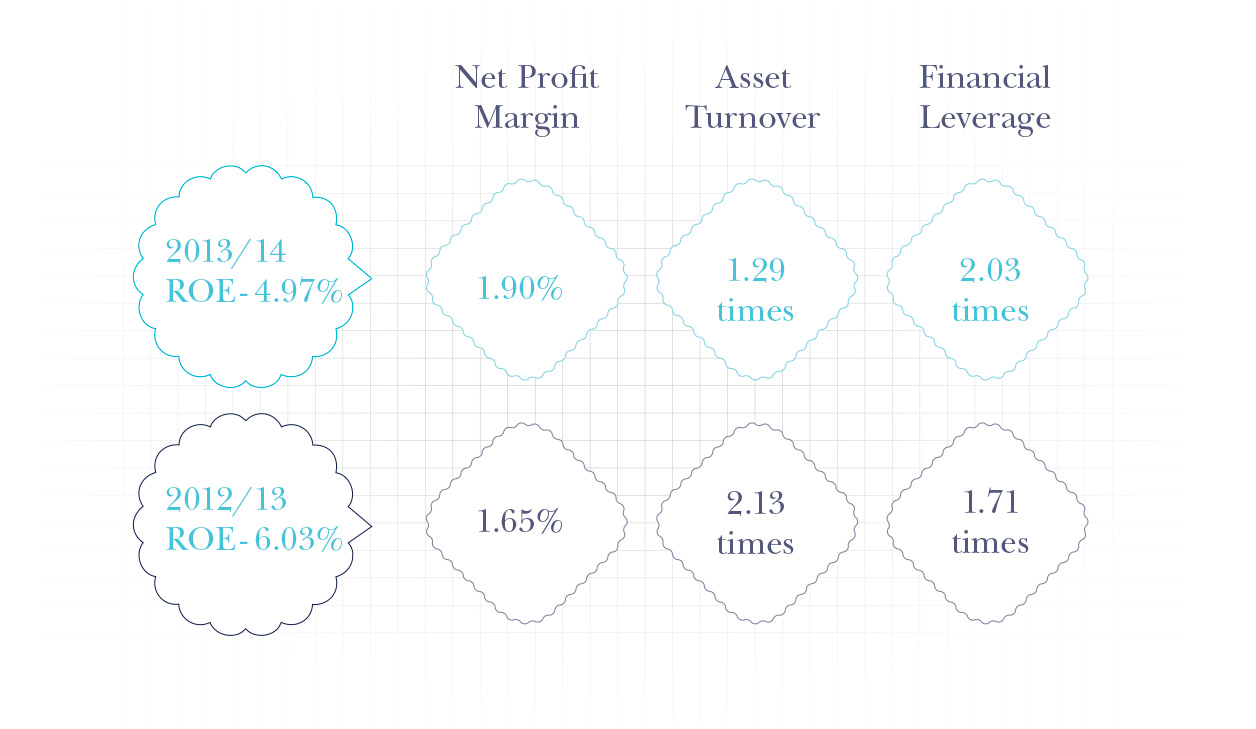
The Group’s current ratio at the year-end was 1.50:1, which is a reduction from the corresponding ratio of 1.71:1. Prudent management of working capital continues to be a key focus area and receives focused attention on a priority basis. Inventories as at the year end increased to Rs. 4,867 mn compared to the Rs. 4,141 mn previous year. Year end trade and other receivables increased to Rs. 2,742 mn from a corresponding figure of Rs. 2,086 mn. The increase in trade receivables can be mainly attributed to higher level of turnover in March 2014 compared to March 2013.
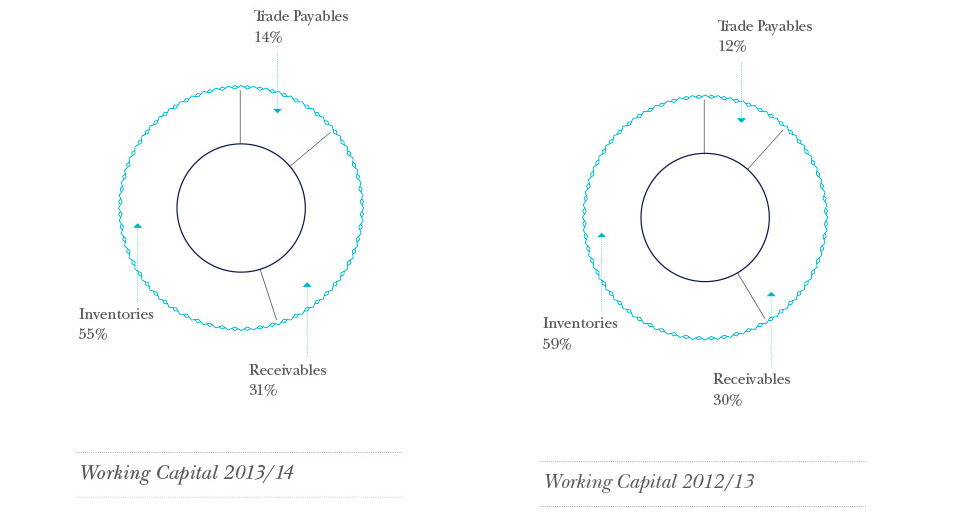
Long-term debt was obtained mainly to finance PP&E. The outstanding long term debt as at 31st March 2014 was Rs.1,832 mn (2012/13 - Rs.770 mn), details of which are given in note 4.21 to the financial statements. Short term borrowings were obtained to finance working capital. The outstanding balance as at 31st March 2014 on account of short term loans was Rs. 4,117 mn (2012/13 Rs. 2,647 mn). Consequently, a total of Rs.5,950 mn (2012/13 Rs. 3,417 mn) was outstanding on account of short and long term borrowings as at 31st March 2014. Interest rates on overdrafts are reviewed periodically while rates charged on short term/import loans are determined based on market rates.
The outflow on account of interest and dividend payments amounted to Rs.431 mn and Rs. 88 mn respectively. Outflow on account of Capital Expenditure during the year was Rs. 1.3 bn. (Rs. 1 bn 2012/13). The Group possesses the necessary banking facilities to support its operations.
The Group’s debt to equity, which is calculated as a proportion of the total interest bearing borrowings to equity has increased to 23.15% from 10.10%. Increase in the total Debt (from Rs.770 mn to Rs. 1,832 mn) caused the increase in the Debt to Equity Ratio.
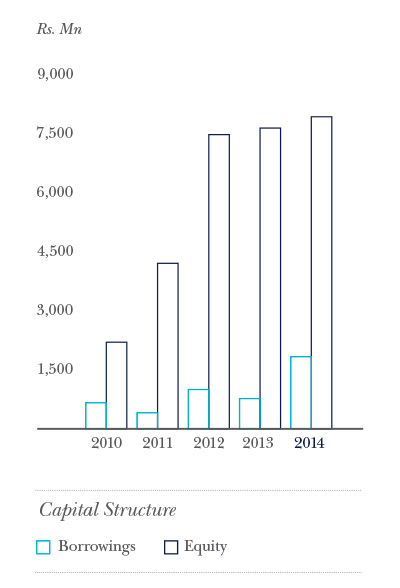
The statement of value added given below shows the monetised value derived from customers and the manner in which it has been distributed.
|
Statement of Value Added |
||||||||
|
For the period of |
Group |
Company |
||||||
|
2013/2014 |
2012/2013 |
2013/2014 |
2012/2013 |
|||||
|
% |
Rs:’000 |
% |
Rs:’000 |
% |
Rs:’000 |
% |
Rs:’000 |
|
|
Gross turnover |
|
20,884,674 |
|
27,711,604 |
|
19,185,246 |
|
26,496,949 |
|
Other income |
|
69,419 |
|
40,321 |
|
69,722 |
|
38,305 |
|
Less : Cost of material and services bought in |
|
(14,669,059) |
|
(21,965,396) |
|
(13,543,863) |
|
(21,118,134) |
|
Value Added |
|
6,285,034 |
|
5,786,529 |
|
5,711,105 |
|
5,417,120 |
|
Distribution of Value Added |
||||||||
|
Employees |
31 |
1,946,395 |
29 |
1,657,099 |
30 |
1,716,714 |
27 |
1,480,637 |
|
Government |
52 |
3,244,962 |
51 |
2,971,591 |
54 |
3,043,731 |
55 |
2,901,017 |
|
Lenders |
06 |
361,698 |
07 |
395,480 |
6 |
348,029 |
7 |
389,620 |
|
Community Investment -Donation |
00 |
43,848 |
00 |
52,122 |
0 |
36,602 |
0 |
51,522 |
|
Shareholders |
01 |
88,764 |
02 |
88,764 |
2 |
88,764 |
2 |
88,764 |
|
Retained in the business |
10 |
599,366 |
11 |
621,472 |
8 |
477,265 |
9 |
505,560 |
|
Depreciation set aside |
04 |
205,825 |
03 |
167,385 |
3 |
197,346 |
3 |
160,665 |
|
Profit retained |
06 |
393,541 |
08 |
454,087 |
5 |
279,919 |
6 |
344,895 |
|
Value Distributed |
100 |
6,285,034 |
100 |
5,786,529 |
100 |
5,711,105 |
100 |
5,417,120 |
The Group operates a central treasury function. It controls decisions in respect of cash management, utilisation of borrowing facilities, banking relationships and foreign currency exposure management. Further, it enables effective cross utilisation of funds between Business Units.
The Group has to gear itself to ride the post-war economic wave. The following financial priorities have been identified in order be in a state of readiness to pursue the opportunities that the rapid economic development will present to the Group.
We are focused on improving profitability through cost management, greater efficiencies, higher value addition and productivity improvements. We will continue to diversify the revenue sources and reduce high dependence on the auto segment. Overall, the budgets for 2014/15 projects an improved performance compared to 2013/14.
A close look at what our employees bring to the process of value creation.

|
Aspect |
Measure |
2013/14 |
2012/13 |
2011/12 |
2010/11 |
2009/10 |
|
Team strength |
No. of employees |
1519 |
1,521 |
1,339 |
1,019 |
864 |
|
Employee attrition ratio |
Employee turnover as percentage of average employees (%) |
17.20 |
21.81 |
21.10 |
19.30 |
14.20 |
|
Gender distribution |
Female employees as a percentage of total employees |
10 |
10 |
11 |
10 |
9 |
|
Age distribution |
Percentage of employees below 40 years of age |
79 |
79 |
81 |
76 |
72 |
|
Employee satisfaction |
Employee Satisfaction Index (%) |
61.10 |
53.46 |
62.7 |
54 |
54 |
|
Knowledge and skills development |
Average training hours per employee |
13.10 |
16 |
13.52 |
10.9 |
10.34 |
Employees provide the fire and passion to the process of value creation. They guide the Company through its supply chain, providing direction to what it does and delivering enhanced value for the Company, the environment, other stakeholders, and for themselves.
Seeking the best talent, playing the game according to the highest standards of ethics and compliance, providing opportunities for employees to evolve, grow and learn, responding to their expectations and creating new opportunities for them, are very much a part of the DIMO philosophy.
Building human capital starts with talent seeking, continues with talent acquisition and then seeks as its goal, talent transformation and evolution. The Company’s philosophy is focused on transforming employees from being part of an organization to being part of a vision and a passion; to invest and move employees from mere physical belonging to emotional commitment and self-discovery.
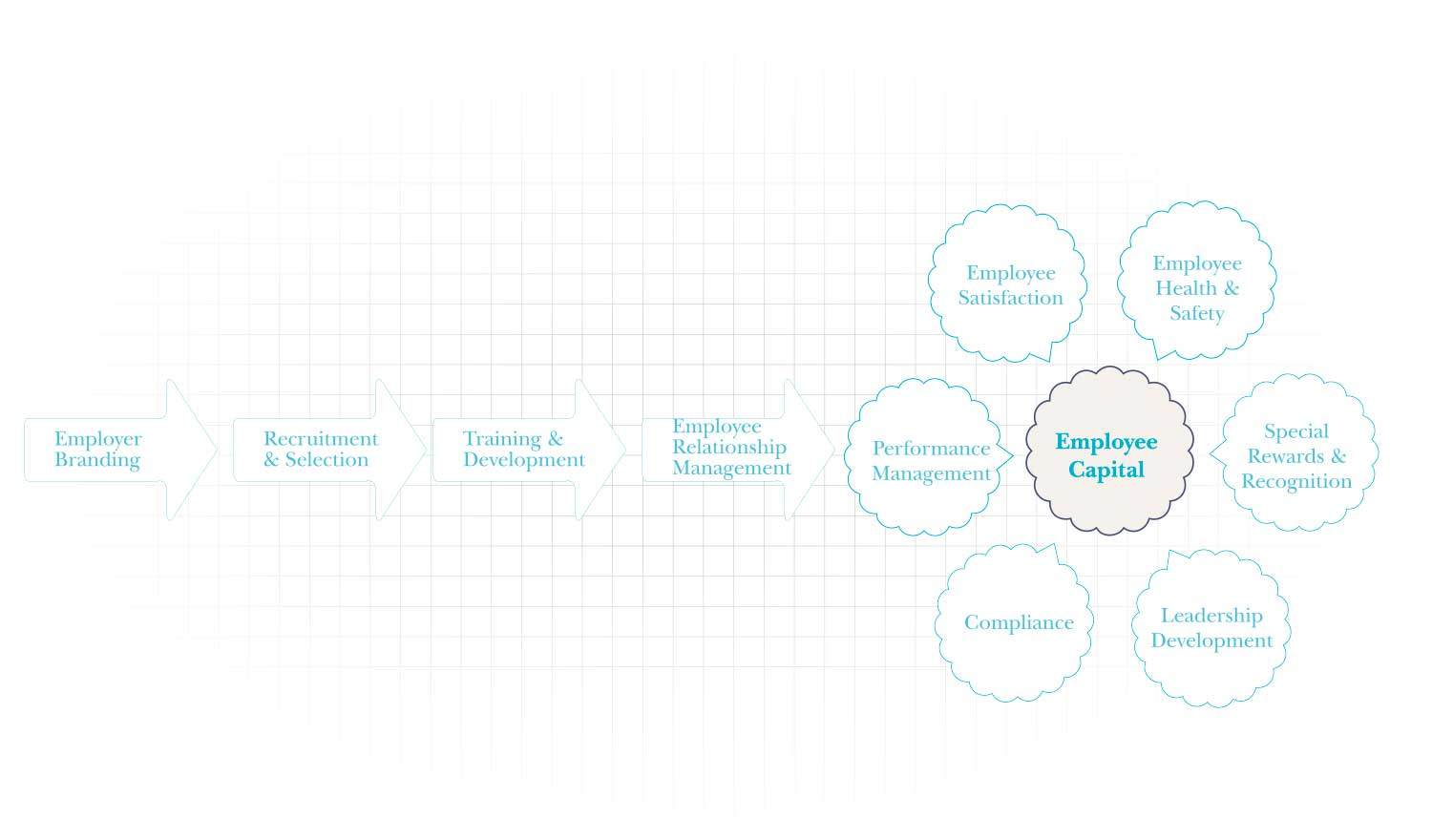
The value the Company adds to its brand has many benefits, one of which is to attract new and accomplished talent into the organization. The work of the company, the working environment, the accolades it receives and satisfaction levels of existing employees combine to enhance employer brand value and attract new and talented recruits to DIMO.
The Company has over the year sought partnerships and collaborations with universities and technical institutes, both as a way of building value for those institutions and as a way of attracting some of their best talent. This is complemented by the strategic use of social media to market DIMO and attract new human capital.
DIMO has also invested in the development of its own training schools with a view to capturing and nourishing talent. Today, universities, technical schools, NAITA, and the Company’s own training schools are the main source of the company’s new talent. During the year under review 258 new employees were recruited and 260 employees left DIMO to pursue other opportunities.
Training requirements are identified through an annual evaluation of employees. The results of this are analysed and then training and skills development programmes designed to respond to the feedback provided by employees.
A total of 295 training interventions were implemented over the past year. Training was provided in Sinhala, Tamil and English. The average training hours per employee for the year was 13.00 (16.00 in 2012-13). In addition 83 employees had the opportunity to hone their skills in several overseas environments.
Training is not confined to work related skills. It extends to personality development, including emotional and physical growth and is aimed at the full flowering of the human personality.
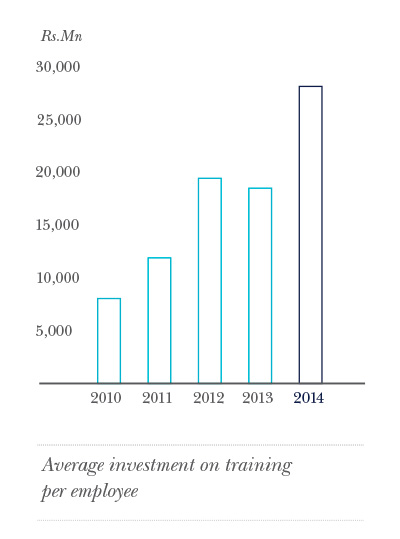
Communicating with employees and providing channels for them to communicate horizontally and vertically is vital if capital is to be nourished. The human resources division visits locations on a periodic basis where employees can meet representatives and voice grievances or discuss other matters.
The Company’s Employees’ Council enables employees and management to have regular and candid discussions on a variety of matters pertaining to the Company’s activities. These discussions cover matters such as working conditions, recruitment policy and Company strategy.
A comprehensive grievance policy enables all employees to take their grievances before an independent mechanism. Grievance response seeks to ensure that all employees receive a fair hearing and that the responses are forward looking. The Company ensures that it responds to grievances within 10 days. Last year 28 grievances were received by the management, all of which were satisfactorily resolved.
The Company’s human resource and human capital policy is available on the Company’s intranet and is accessible to every employee. The Employees’ Council meet once a month and provides an effective forum for a constructive dialogue between the management and the employees.
The Company is committed to protecting the human rights of all employees and this is closely integrated into the Code of Business Ethics of the company. The Company is committed to equal opportunity for all employees and to ensuring a safe and secure environment in all its workspaces. The HR policy ensures that employees are not discriminated against on the basis of gender, ethnicity, caste, old school ties or other distinction. The Company has a whistle-blowing policy which is accessible to any employee with the requisite confidentiality guarantees. The Code of Business Ethics and the whistle-blowing policy are accessible on the Company’s intranet.
Expenses related to professional advancement and the acquisition of knowledge are reimbursed by the Company. This includes subscriptions to the memberships of professional associations.
Work is also fun at DIMO. The ‘Biggest Loser’ competition attracted a lot of attention and some serious competition for the title. The DIMO quiz was keenly contested as it is each year. The Toastmasters’ Club provided an opportunity for employees to showcase their oratorical skills.
Employees are evaluated twice a year against key achievements. Competencies and personal development are discussed and feedback encouraged. A computer based performance management system allows supervisors to evaluate performance and manage employees in a structured manner. Innovation is encouraged at all levels. Incentives are offered to high performers and ultra-high performers are provided with additional incentives.
Value is enhanced by identifying strategic channels of leadership. The Company gives priority to identifying leaders and providing opportunities for them to develop their talent. Every year the Senior Management team is provided with opportunities for participating in programmes at some of the leading universities in the world. The company’s ‘D-talent programme’, is designed to fast-track young talent, and continued to focus on young employees and provided them special learning opportunities during the past year.
The Company’s quality management system (QMS), which has ISO accreditation, deals with all aspects relating to employee safety. Internal and external audits on the effectiveness of QMS provide assessment on aspects relating to safety and health. The Company obtained the services of the National Institute for Occupational Safety & Health to carry out a risk assessment on employee health and safety aspects.
Every year DIMO conducts an employee satisfaction survey to which employees provide answers in anonymity. Employee satisfaction is assessed in all areas of the Company including remuneration, perquisites and working conditions. The results of the survey are analysed by the Group Management Committee and changes are made where appropriate. The survey had a response rate of 91% (91% - 2012/13). The overall satisfaction index was 61.1%, up from the figure of 53.46% the previous year.
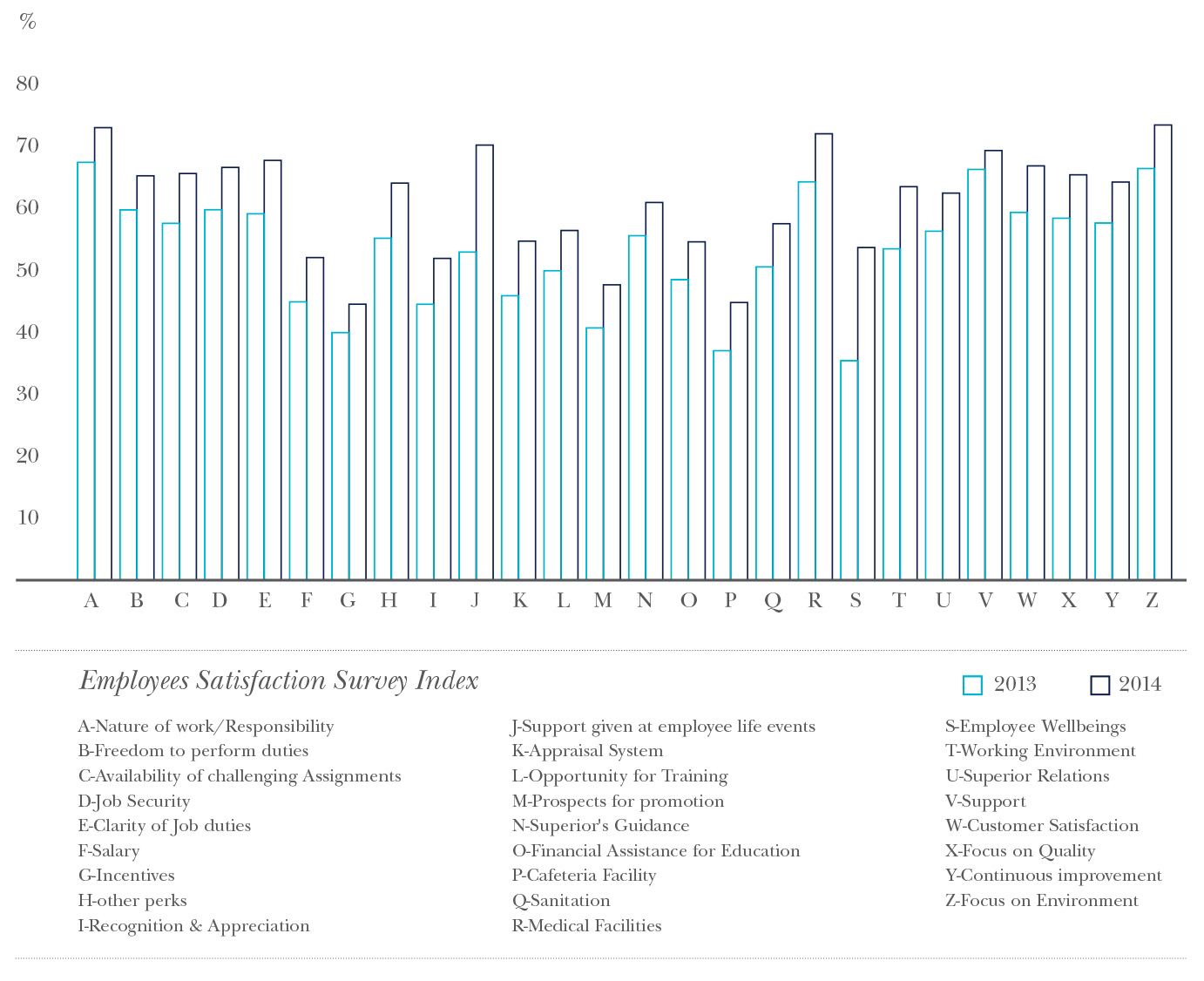
The Company has in place a number of awards schemes to reward innovation and commitment. The ‘Employee of the Year’ walks away with a car for his or her outstanding contribution and the ‘Ideas Man (or Woman)’ who comes up with an innovative idea for the year receives special recognition at the Employees’ Council. Last year 62 DIMO employees were recognized by the Company for their contribution to developing innovative practices and solutions.
DIMO aims to recruit staff from all ethnic and language groups and from all regions of the country. Staff diversity is a value the Company actively seeks to promote. Last year females constituted 10% of the total workforce. Employees with a record of long service receive special recognition from the Company.
The vehicle workshops and the sales positions that involve travelling have contributed to seeing that the gender ratio is below what the Company would have liked to have maintained. The Company recruited 10 female trainees to its vehicle workshops over the past year in an endeavour to redress the balance in what is traditionally considered a ‘male’ environment.
79% of the Company’s employees are below the age of 40. 43% of them are less than 30.
The monetised value distributed to employees during the year was Rs1, 946 Mn (Rs1, 657 Mn in 2012/13) and constituted 32% (29% - 2012/13) of the monetised value created. The average employee cost per head for the year was Rs1.3 Mn (Rs 1.4 Mn - 2012/13).
Employee aspirations continue to grow and evolve. The Company will strive to align employee aspirations with Company aspirations and focus on building long term relationships that are mutually rewarding. It will strive to see that employees make a constantly growing contribution to the value creation process. The Company will make sure it creates an environment that stimulates innovation and provides material and other support for employees to learn and pursue professional goals. Employee capital will continue to be nourished at DIMO.
Customers are at the heart of all that we do. Our success depends upon their satisfaction.
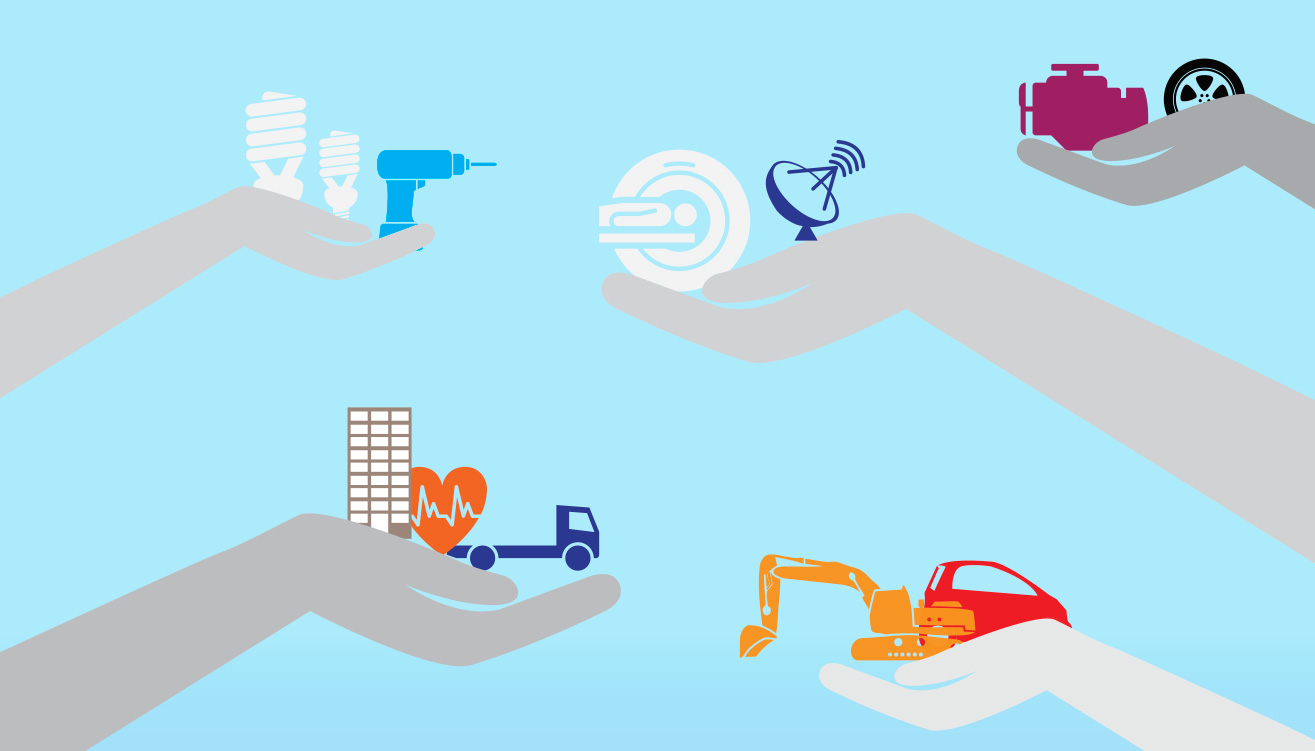
|
Aspect |
Measure |
2013/14 |
2012/13 |
2011/12 |
2010/11 |
2009/10 |
|
Customer Service |
No. of CRM Personnel |
30 |
35 |
42 |
4 |
3 |
|
Customer Convenience |
No. of Customer Interaction Points |
60 |
52 |
40 |
25 |
19 |
|
|
No. of Business locations in the North and East |
7 |
8 |
4 |
0 |
0 |
|
Customer Satisfaction |
Average Customer Satisfaction Index (%) |
88 |
85.5 |
89.2 |
85.6 |
86 |
Customers lie at the heart of what the company does. The Company’s business model is built around customers and is designed to meet their diverse needs and enhance their multiple experiences. The Company fosters customer capital by investing in long term relationships that are mutually beneficial, rewarding and transformative. The Company builds value by creating a complete customer experience that straddles the material, intellectual and emotional aspects of all products and services it provides.
Seeking and reaching out to new and diverse customers, engaging with them to understand their needs, building internal competencies to serve customers better, enhancing standards of responsibility, conforming to statutory and ethical norms, and constantly raising the bar with regard to customer care, shape DIMO’s approach to building customer value.
Accessibility is an important aspect of fostering customer capital. A closer proximity to the customer increases the opportunity for understanding customer needs, developing well-tailored products and services, and the likelihood that the customer will return asking for more. During the year under review the company operated 60 ‘Customer
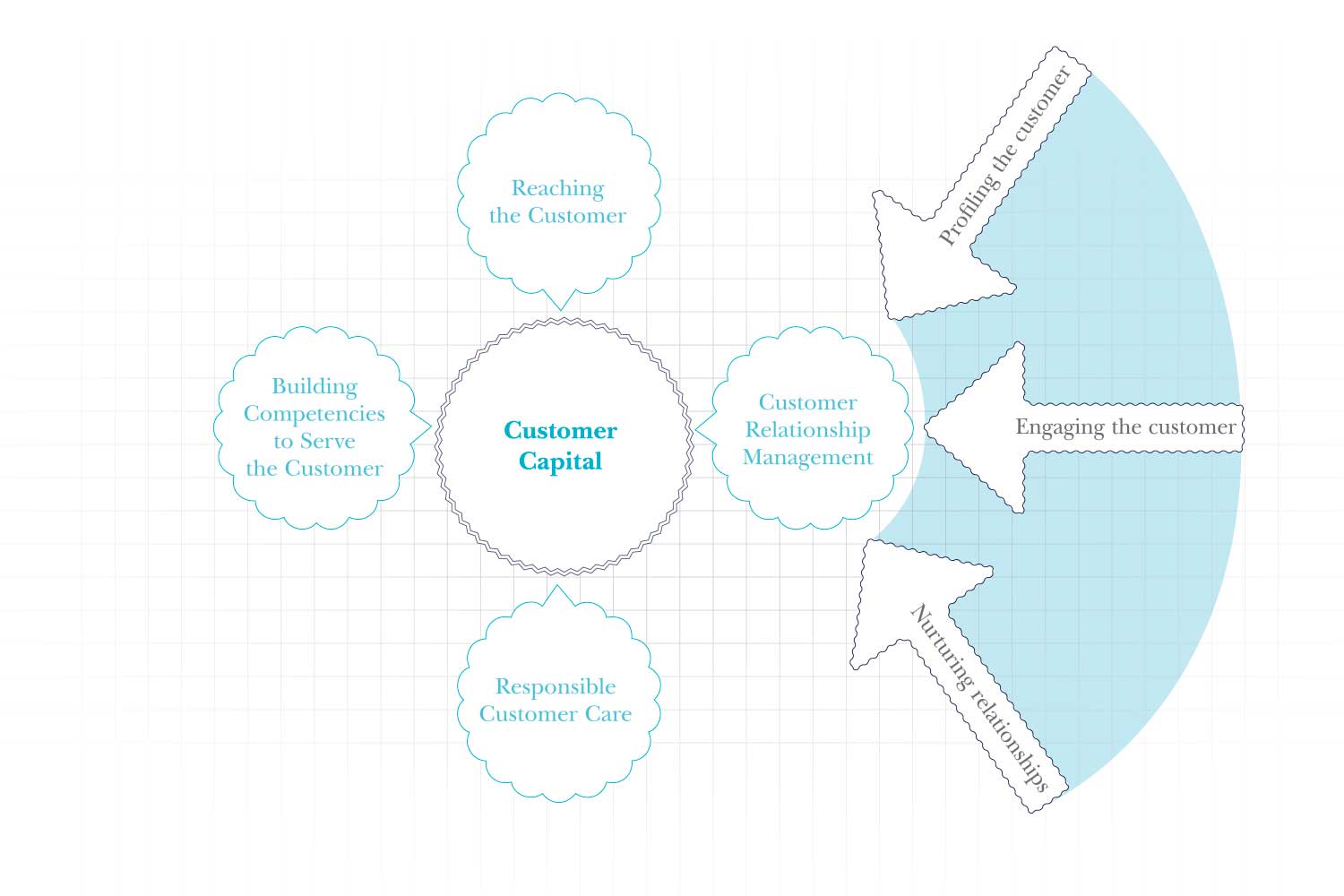
Interaction Points’, up from the 52 operated in the previous year. They consisted of Branches, Customer Contact Points and Display Points. Each of these is designed to reach and serve the company’s diverse customers in the most effective way. The first such contact point was opened in Piliyandala in December 2011 and since then the Company has made a strategic effort to make itself more accessible and to develop this aspect of its capital.
An important part of the accessibility programme is the 24-hour Call Centre launched in May 2012. Customers can make use of the Call Centre at any time to seek information on products and services and lodge complaints. The Call Centre has been a giant leap forward in reaching out to customers and enables the Company to be available 24 x7. During the year under review 29,555 sales enquiries were received. It has been supported by a state-of-the-art interactive web site which provides detailed information on the Company, its products and services. Customer engagement programmes have been taken to a new level with the launch of the ‘Gamin Gamata’ (‘Village to Village’) programme which endeavours to penetrate new and emerging markets.
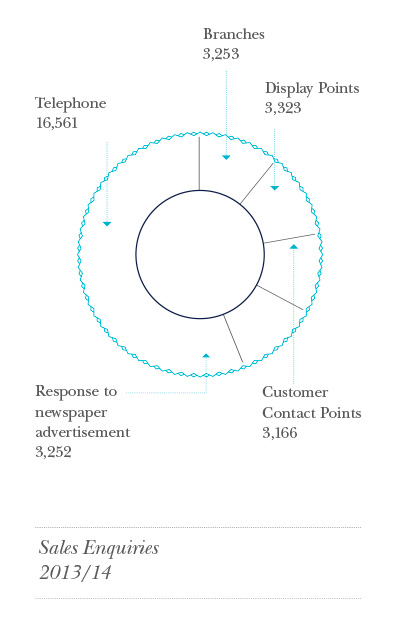
Strategic arrangements have been made with some of the finance and leasing companies to enable customers to reap the benefits of special interest and payment schemes and provide additional incentives to invest in the Company’s products and services.
Building customer capital and being responsive to customer needs has required a substantial and constant investment in skills. Existing skills need to be honed and new skills generated if the Company is to respond effectively to customer needs and expand its customer base.
The Company has identified the skills deficiencies within the Company and then sought to fill these gaps in the most productive way. No stone is left unturned in order to acquire and constantly expands the skills sets within the Company. To DIMO this is of the essence in building this segment of capital and enhancing value.
Continuous training and skills development is an intrinsic part of the human resource strategy at DIMO. This includes in-house training, external training and overseas training. During the year under review the sales and service teams, spent a total of 4,096 and 4,989 man hours (3,444 and 8,395 in 2012/13) man hours respectively on training and skills development. This comprised of 642 (588 in 2012/13) sales staff who participated in 111 (119 in 2012/13) training programs. 763 (822 in 2012-13) service staff participated in 108 (138 in 2012-13) training programmes.
Value is built by focusing on responsible customer relationships and the highest standards of care. As a Company that markets world class products and services, DIMO is conscious that its products should be safe and created through ethical manufacturing processes. The Company’s products and engineering solutions conform to the highest levels of safety and are designed to ensure minimum impact on the environment. In its after care too the Company seeks to ensure the highest levels of responsibility and highest standards of ethics in all of its customer relationships.
Priority is given to customer comfort, health, safety and general well-being. In sourcing new products, the Company has always sought the best in the business and those with a long track record of safety. The Company’s quality management system has been given the ISO 9001:2008 certification.
Responsible value creation has meant strict compliance with statutory requirements on the provision of diagrams, expiry dates, code numbers, and environmental impact. Accurate labelling is a must and user manuals are provided, where required.
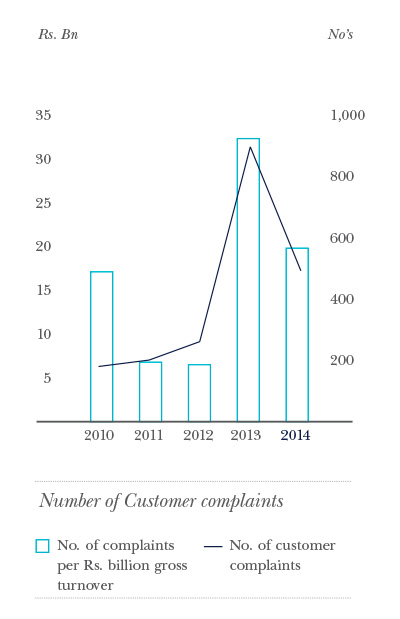
Marketing practices conform to the highest standards of ethics and are based on transparency, honesty and full disclosure. Here too, compliance with statutory requirements is strict. Customer privacy is respected and customer information kept confidential.
A total of 492 customer complaints were recorded during the year under review. This was compared to the 896 complaints received the previous year. Of these, 361 (574 in FY 2012/13) were resolved within three-days as stipulated. The number of customer complaints for every Rs. One Billion of turnover was 19.8, down from last year’s 32.3.
No complaints were received with regard to any breaches of customer privacy or misuse of personal data. Similarly, no incidents were reported during the year under review with regard to breaches of health and safety, or product labelling.
Building relationships that are stable, secure, rewarding and transformative is an intrinsic part of the Company’s value creation process. Customer relationships are ongoing and constantly evolving, marked with periodic engagements and an exploration of the multiple opportunities that the relationship may present.
Nourishing enduring and satisfying relationships is a systemized process at DIMO that straddles marketing, point of sale, delivery, after-care, maintenance, complaints, customer satisfaction and customer return. Much of this is monitored by the centralized Customer Relationship Management division which responds to complaints, carries out customer satisfaction surveys, oversees some promotional campaigns and evaluates periodic reports.
Customer satisfaction is central to the long term sustainability of the company. Customer expectations and demands are constantly mapped and since 2002 customer satisfaction surveys have been used as an index of measurement and management.
Our business partners are key drivers of our value creation process.
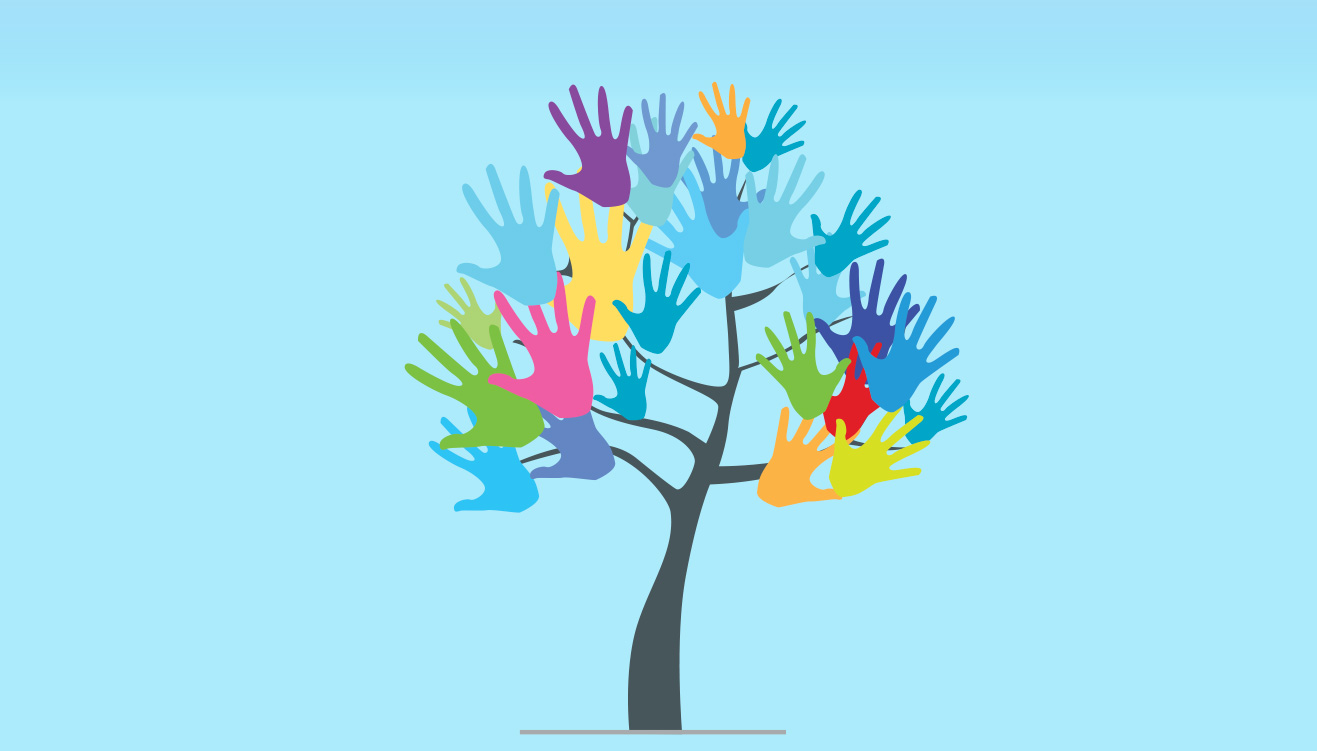
|
Aspect |
Measure |
2013/14 |
2012/13 |
2011/12 |
2010/11 |
|
Relationship with Principals |
No. of principals |
77 |
81 |
78 |
72 |
|
No. of relationships above 50 years |
7 |
6 |
6 |
6 |
|
|
No. of relationships between 25 to 50 years |
8 |
10 |
9 |
9 |
|
|
No. of relationships between 01 to 25 years |
54 |
58 |
55 |
41 |
|
|
No. of new relationships commenced during the year |
8 |
7 |
8 |
16 |
|
|
Relationship with local suppliers |
Payments to local suppliers (Rs. bn) |
5.3 |
4.7 |
4.5 |
3.9 |
DIMO’s business partners are a key source of capital in the company’s value creation process. The company’s principals, suppliers and service providers are a core component of the value creation activity at DIMO. Through this process the company not only builds value for itself but for the business partners as well.
Three important ideas have shaped our relations with our business partners: trust, transparency and longevity. Using these three ideas, we have invested in long term mutually rewarding partnerships.
In sourcing partners, the company has tried to identify companies that share DIMO’s values. DIMO is committed to responsible and sustainable entrepreneurship and in its dealings with partners has made an effort to develop relations with those entities that share a similar commitment. In forging new partnerships, the company has looked for those entities that are committed to environmental protection, respecting labour standards, promoting human rights, fostering equal opportunity, eliminating corruption and anti-competitive behaviour, and ensuring occupational safety at the workplace. These values are reflected in the company’s Supplier Code and suppliers have responded positively in integrating these values into their own supply chains. Upto last year 96 major local suppliers committed to upholding the Supplier Code.
The company has sought to grow its portfolio by seeking principals that complement DIMO’s strategic direction. The company has been fortunate to have partnered with world class brands over these 75 years.
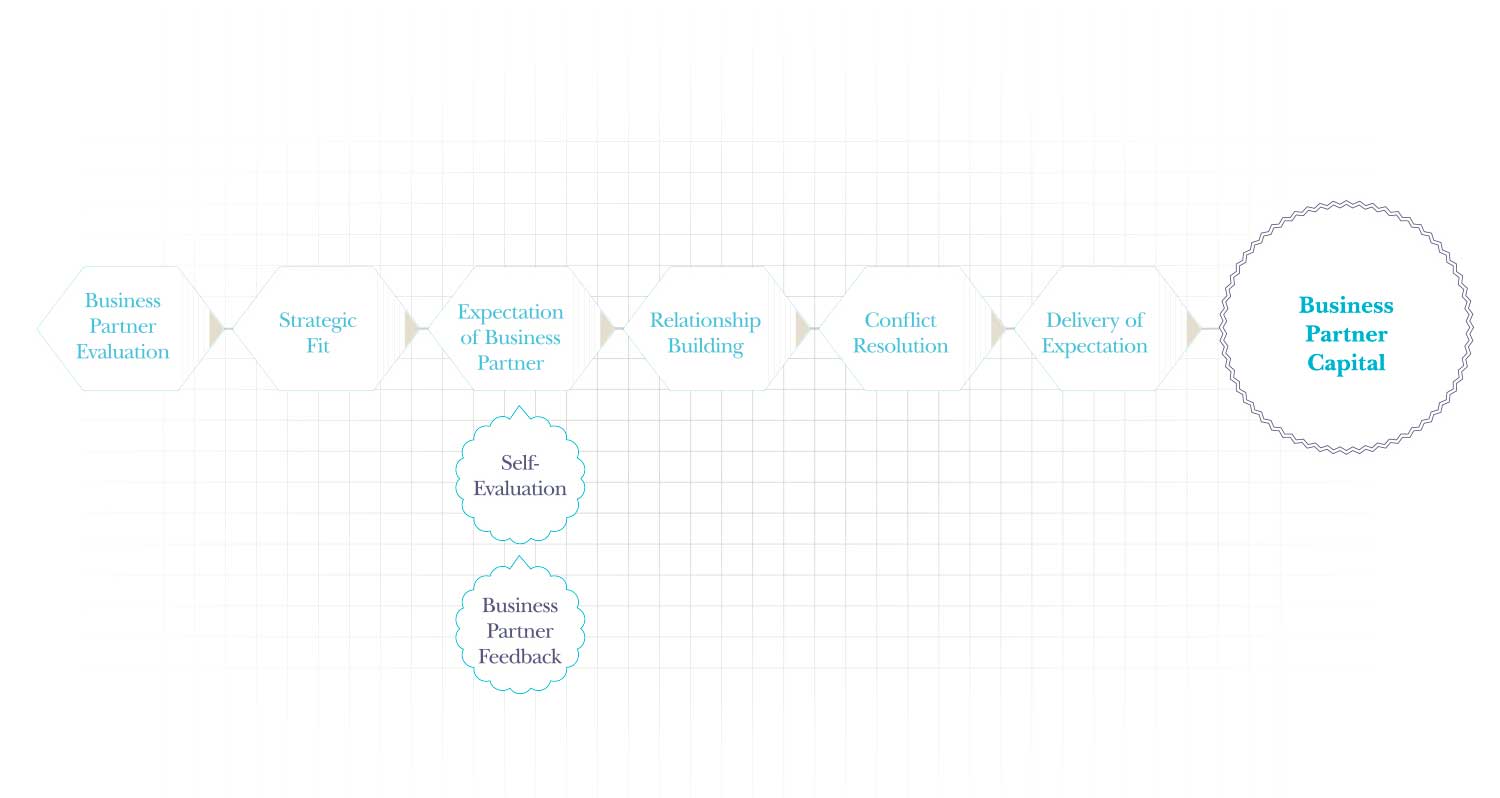
DIMO has absorbed industry best practices and technical knowhow from these principals, through constant interaction, which have included regular visits to their locations or visits from their representatives to the company. Regular feedback is provided to principals and they in turn provide regular feedback to the company. Healthy partnerships have emerged as a result of this policy of open and candid communication and regular contact. This has helped the company to consistently deliver to the highest standards expected from the principals. The company is responsive to the feedback provided by principals and has responded by investing in technical training, infrastructure development and distribution networks to strengthen our market presence.
In the case of local suppliers and our distribution partners too, the company has focused on investing in long term relationships. Regular communication, sharing of market information, a commitment to core values and constant feedback have helped in developing mutually beneficial relationships. In some cases the company has invested in the development and empowerment of family members of local suppliers through a variety of interventions.
During the year the company paid Rs: 5.3 bn (2012/13 - Rs. 4.7 bn) to local suppliers.
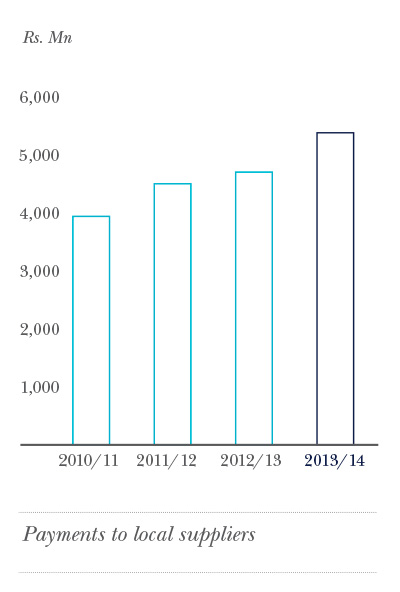
Grievances, if any, that emanate from the company, local suppliers or principals, are resolved speedily. Regular feedback and communication with partners has reduced the space for conflict. The company has aimed at constructive and critical engagement with all partners. It is an engagement that is forward looking and solution oriented and aimed at strengthening already existing relationships.
Integrated into the company’s process of value creation is the regular use of independent third-party stakeholder surveys, which include interviews with suppliers, market research for business development and assessing customer satisfaction. The surveys involving business partners are aimed at generating candid feedback on relationships with business partners and on how these relationships could be developed and strengthened. The company has a policy of sharing the results of such surveys with suppliers.
How do we contribute to nation development and empower the diverse people with whom we live and work?

|
Aspect |
Measure |
2013/14 |
2012/13 |
2011/12 |
2010/11 |
|
Investing in the community |
Community investments as a percentage of turnover (%) |
0.21 |
0.19 |
0.14 |
0.10 |
|
Vocational development of youth |
No. of vocational training students as a percentage of |
16.78 |
10.50 |
14.24 |
14.52 |
|
Contribution to the state |
Taxes paid to the government (Rs. Mn) |
3,245 |
2,972 |
6,062 |
5,571 |
Society and local communities are important contributors to the company’s supply chain and to how and how much the company creates value. The value the company builds in turn makes an important contribution to the development of the country and society. Social acceptance and continuous management of our relationships with the community within which we operate are critical for the longevity of our business. Being in touch with the pulse of the people who are affected most by the company’s activities ensures that DIMO builds sustainable value.
Institutional stability is vital for sustainability and this is why DIMO goes to great lengths to partner and maintain positive relationships with relevant local authorities. The company is aware of the adverse effects that deviations from the regulatory framework could have on the company’s reputation.
The company ensures that its compliance with the regulatory regime is strict and this includes compliance with environmental, product safety and labelling regulations.
During this year under review, the company paid Rs. 3,245 (Rs. 2.96bn in 2012/13) in taxes to the state. Taxes are paid promptly and in strict compliance with the legal regime that is in force; the norm being that no such monetary obligations are left pending.
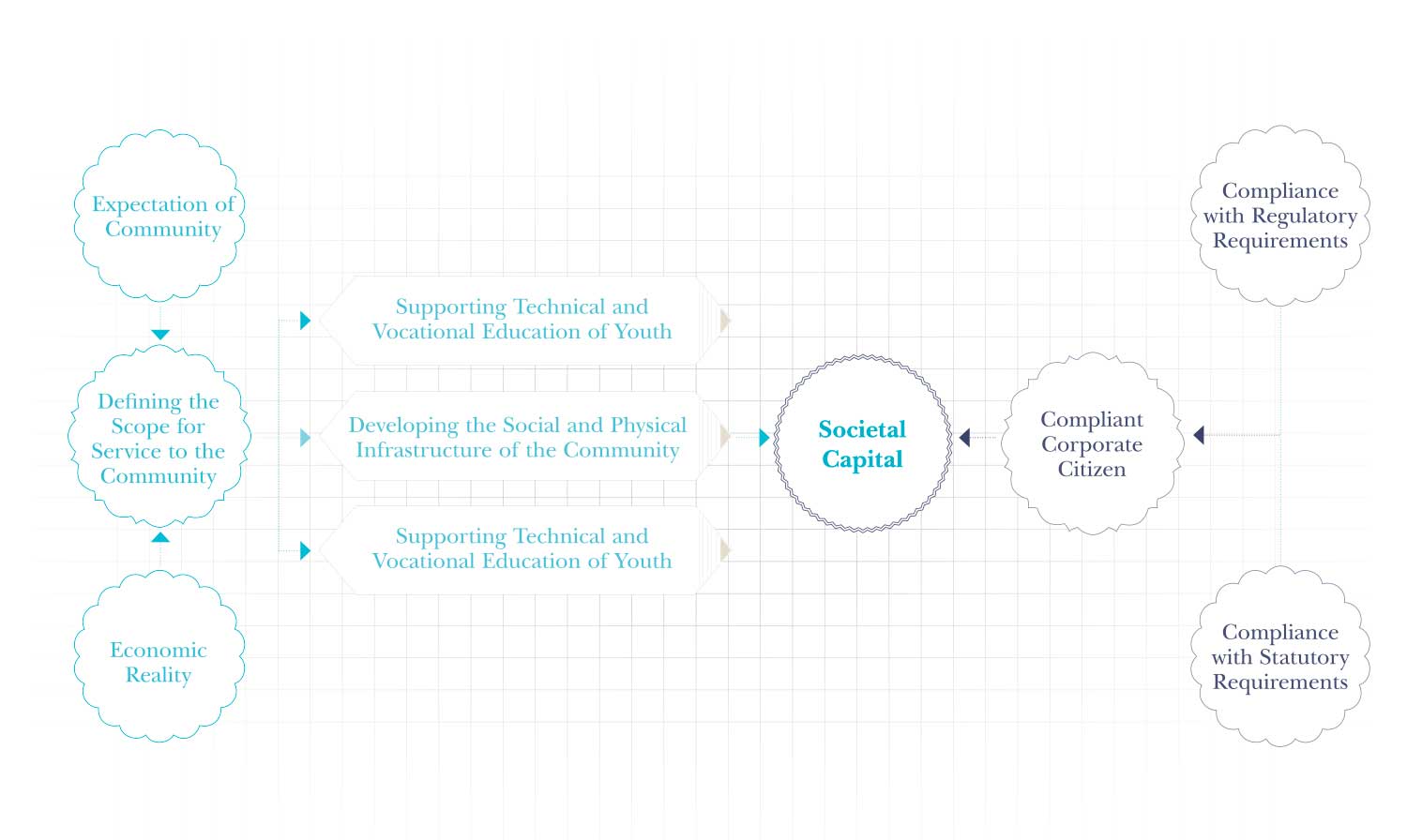
Regular training programmes for staff ensure that employees are kept abreast of changes in tax structures, tariff regimes and other regulatory changes including local government and environmental regulations, new labour regulations, and consumer product safety regulations.
In keeping with the company’s goal of delivering the best in products, solutions and service to customers, DIMO has developed relations with a number of trade, industry and professional associations. This has helped the company align itself with industry best practices and play a role in the formulation of policy.
DIMO builds value by ensuring that all of its business practices are ethical, transparent and honest in all circumstances. The company’s processes within its supply chain are designed to ensure ethical outcomes at all times.
The company has in place a comprehensive ‘Code of Business Conduct and Ethics’ which is periodically revised and refined as business practices evolve. It covers anti-corruption, anti-competitive behaviour, non-discrimination, fair dealing with peers, equal opportunity, and dealings with public institutions, amongst other things. The Code can easily be accessed on the company’s intranet.
The company does not make contributions to political parties or seek to influence political action. On the other hand the company works with regulatory and non-regulatory bodies and professional associations to design relevant policy frameworks and shape relevant laws. Last year there were no breaches of the company’s Code of Business Ethics.
Community acceptance for the value that DIMO builds is important for sustainable and responsible entrepreneurship. Smart management of relationships with the community helps build value for the company.
The company engages the community in multiple ways, including by way of independent stakeholders surveys. These engagements help the company to identify the pulse of the community, understand community perceptions and feelings, and respond to community needs. The results of these engagements including the stakeholder surveys, are analysed by the Sustainability Committee which formulates targeted interventions. These engagements are used to develop products and other responses that are responsive to the nuances of community needs and aspirations.
Last year the company made interventions in three strategic areas:
1. Technical and vocational education for youth
2. Developing community infrastructure
3. Enhancing livelihood opportunities
Total expenditure on these initiatives was Rs. 43.8 mn (Rs. 50.8 mn in 2012/13).
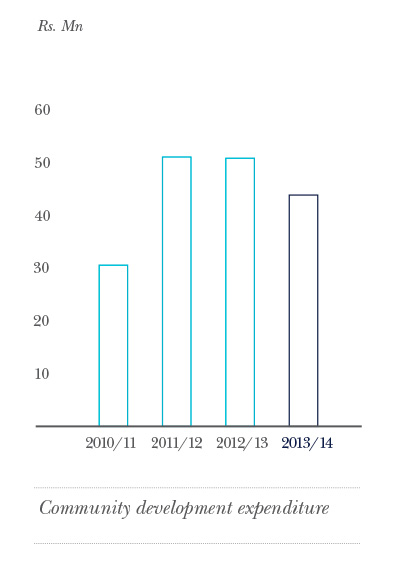
DIMO Automobile Training School (DATS)
The DIMO Automobile Training School opened its doors to the nation’s youth in 1990. In 2010, DIMO’s commitment to vocational education led to the opening of another training school in Jaffna. The state-of-the-art training schools at Siyambalape and Jaffna are two key channels through which the company provides free vocational and technical education to youth.
DATS provides young people the opportunity to work with world class brands and state-of-the-art technology. So far, 368 students have passed out from DATS as diploma holders. The schools develop a pool of technical expertise within the country and also provide a recruitment source for DIMO. There is no obligation for these trainees to work for DIMO and they are free to chart their career path. DATS has tried to break gender stereotypes by making a special endeavour to train and recruit female mechanics for the automobile sector. At present, there is a batch of 10 female students enrolled at DATS. DIMO invested Rs: 22.9 mn on the two schools during the reporting period.
Other initiatives the company undertook last year include the provision of technical training programmes on the use of agricultural machinery, career guidance workshops in collaboration with the universities of Sri Jayewardenepura and Moratuwa, provision of school materials, food items to disabled and disadvantaged groups and the provision of Mobile career counselling to rural youth through our partnership with Deutsche Gesellschaft Für Internationale Zusammenarbeit (GIZ) GMBH.
Moreover, students from the following institutions received vocational training at DIMO:
During the reporting period, 209 apprentices were given the opportunity to obtain their vocational training at the company’s facilities (154 in 2012/13). As of now, there is a total of 258 apprentices receiving technical training.
Investments in community infrastructure
plays an important role in relationship building. Last year trainees from the DIMO Automobile Training School helped in the renovation and development of the Kalotuwawa Primary School in Dedunupitiya. The water supply system at the iconic Athugala Samadhi Temple in the Kurunegala District was strengthened to help the thousands who flock there every year. The company also opened the state-of-the-art DIMO Technical Institute in Sooriyawewa, which is equipped with state-of-the art driver and technical training facilities.
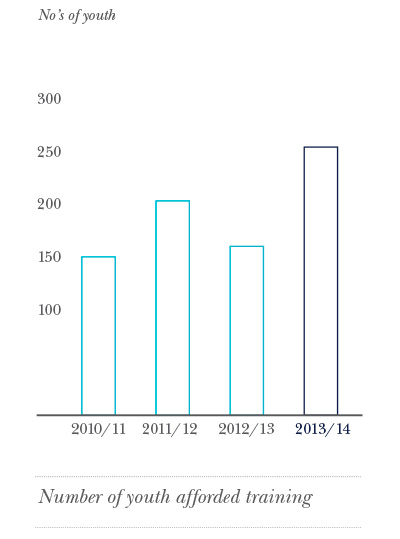
DIMO continues to build value by investing in local communities and in livelihoods in different parts of the country. A special focus is given to disabled, disadvantaged communities. The company has developed a special programme of assistance for disabled persons, including disabled soldiers and children, for their empowerment and their equal access to opportunities.
Some of the community empowerment projects carried out during this reporting period include awareness programmes on disease prevention, child nutrition programmes, blood donation camps, development of religious sites, opportunities for rural entrepreneurs to own low cost commercial vehicles, soil testing and agricultural awareness programmes for farmers and partnering with local universities to carry out research to modify logistics related regulations
Our quest for perfection is driven by our intellectual capital – the source of all intelligent innovation and creative ideas.

Our store of intellectual capital is built through multiple synergies derived from the value creation process. These synergies are manifested in three intangibles; organisational knowledge based intangibles or expertise, process capital - the systems and processes that are unique to DIMO and brand equity, that is, the name, logo and perceptions that identify our company in the public eye.
These three capitals help drive the company’s value creation activities. Value creation and intellectual capital are thus inter-dependent while innovation is a key factor that is embedded in the value creation process.
The company’s organisational knowledge-based intangibles are embedded in the corporate culture, structures, processes of governance, data and information and the nuances of intuition among employees.
The DIMO corporate culture enables learning, provides opportunities to explore and innovate. The company also encourages an open culture of knowledge-sharing and building on knowledge already acquired, across different tiers.
Over the years we have developed robust organisation-wide processes, core value creation activities and support services that have evolved processes that are unique to the company.
The DIMO brand is now a ripe old ‘75’. It has all the characteristics and advantages of a vintage brand, rich, robust, owning years of acquired skills and long relationships with diverse stakeholders. At the same time it carries the advantages of a young brand - adapting easily to change and embracing new ideas and challenges with gusto.
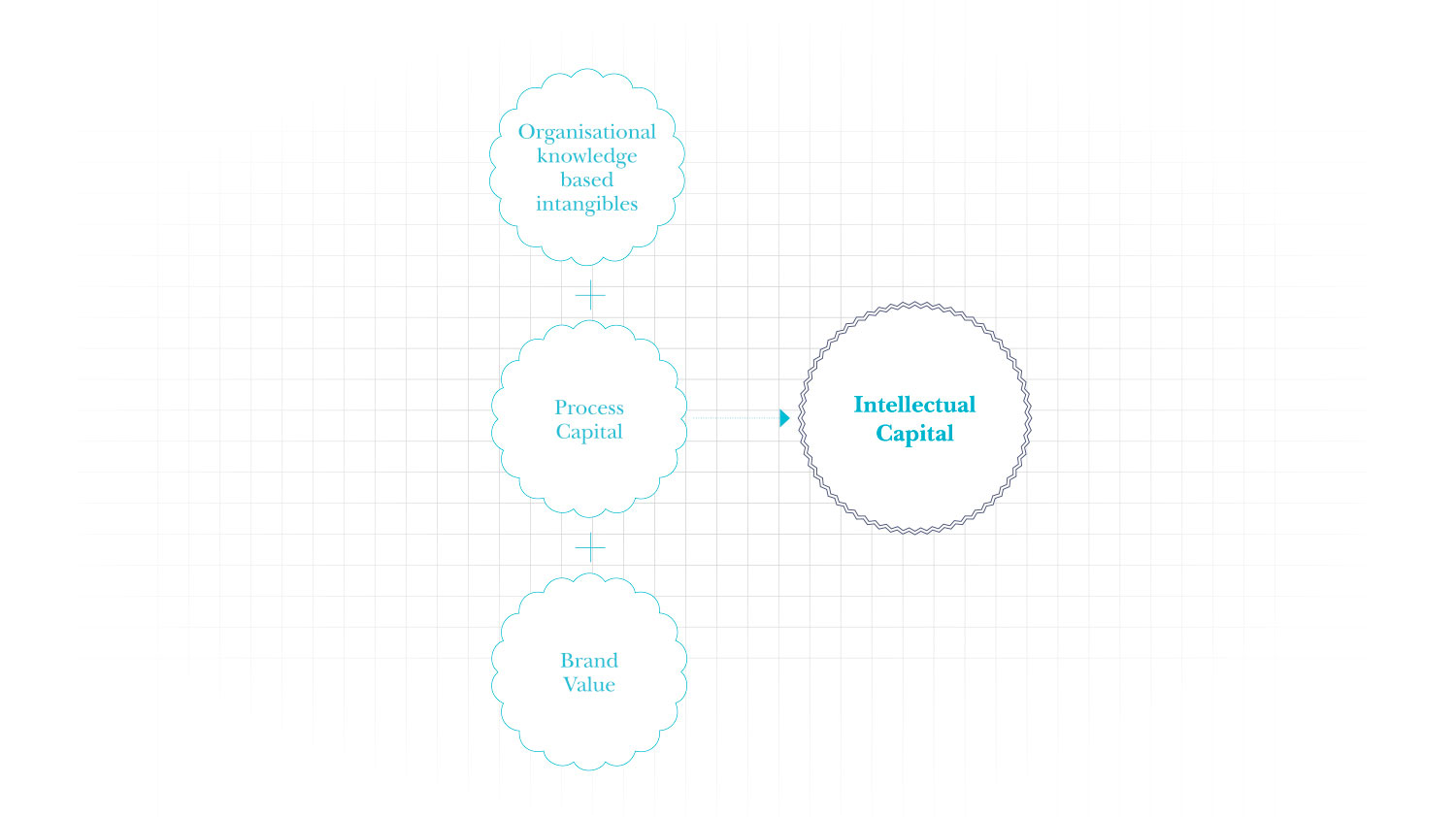
The DIMO brand is another form of capital that contributes to building value within the company. The brand is an integral element of the company’s innovative supply chain process that in turn, replenishes and rejuvenates the brand.
One of DIMO’s brand strengths is the trust and goodwill the company has generated over the years. Our portfolio of quality products and our expert, responsive after-care services have ensured that our customers return to us over and over again.
Minimising the impact that we have on our physical environment and inspiring our employees and society to internalize the values of conservation remain our priorities.

|
Aspect |
Measure |
2013-14 |
2012/13 |
2011/12 |
2010/11 |
2009/10 |
|
Combating Climate Change |
Carbon footprint tCO2 e per Rs. 1 mn of Group net turnover |
0.2773 |
0.2218 |
0.1674 |
0.1064 |
0.2472 |
|
Energy Consumption |
Total energy consumption (1,000 GJ) |
52,333 |
60,547 |
78,184 |
32,264 |
26,210 |
|
|
Energy consumption (Giga joules) per employee (on average) |
34 |
42 |
58 |
31 |
30 |
|
Water Consumed |
Total water consumption (m3) |
90,487 |
101,984 |
75,640 |
46,408 |
37,572 |
|
Water Recycled |
Ground water recycled and reused as a percentage of total water consumption (%) |
24 % |
21.00 |
15.00 |
24.00 |
34.00 |
|
Waste Management |
Hazardous waste (solid) sent for recycling/reusing - Kg |
125,153 |
132,364 |
65,989 |
37,002 |
N/A |
|
|
Hazardous waste (liquid) sent for recycling/reusing - Litres |
107,646 |
105,506 |
94,267 |
80,295 |
N/A |
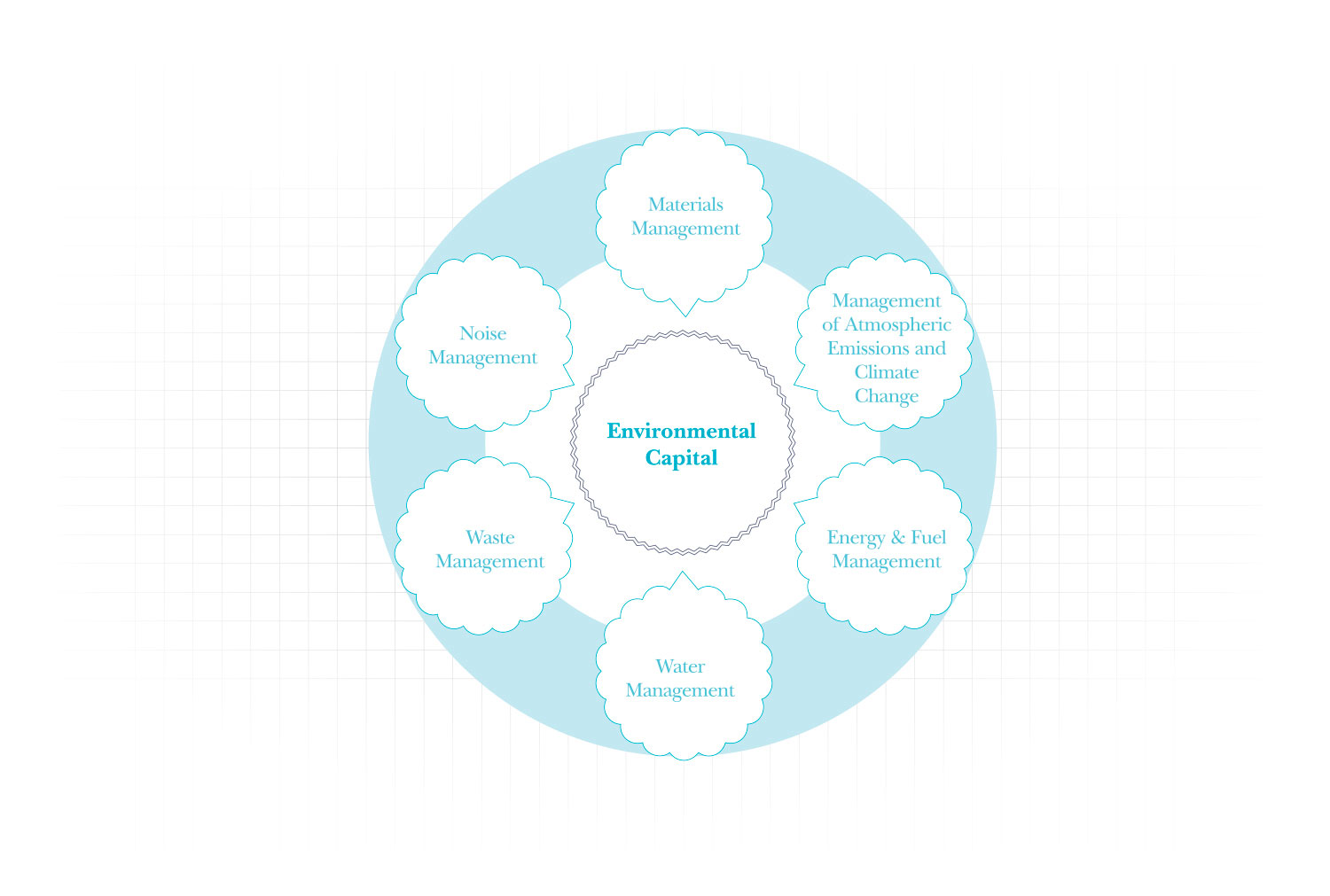
DIMO’s environmental strategy is driven by two principles. The company’s first principle seeks to minimize the impact that the company’s operations have on the physical environment. The second seeks to inspire employees and society to internalize the value of conservation and to commit to minimizing the impacts on the environment. DIMO’s environmental strategy is grounded in the idea that the company should re-use, re-cycle and replenish wherever possible, and preserve today’s physical environment for generations yet unborn.
All forms of entrepreneurship impact on the environment. For entrepreneurs the challenge is to minimize adverse impacts and maximize positive impacts. DIMO has in place a comprehensive environmental management system, ISO 14001 (2004) certified, that nudges the company towards environmentally friendly goals. The Environment Management System (EMS) is managed by the company’s Group Management Committee and Sustainability Committee, which oversee all aspects of the system.
Over the years the EMS has identified six areas where the company should minimize adverse impacts and maximize positive impacts.
Emissions are the invisible destroyer. Their impact is subtle and long term and has previously been easier to hide. The main greenhouse gas (GHG) emitted into the atmosphere by the activities of the company is carbon dioxide. DIMO has taken steps to measure and manage emission levels, being conscious of the fact that this could possibly have an impact on the community.
Stakeholder engagement with local communities has also identified their expectation of us to be environmentally friendly. It may also have an impact on the company’s social licence to operate. Climate change continues to pose a major challenge to the global community and the company is conscious of the harm that carbon based fuels cause.
This is the sixth consecutive year in which the company has calculated and reported on its carbon footprint.
The measurement methodology follows the standards laid down in the WBCSD/WRI Greenhouse Gas Protocol’s Corporate Standard (Revised Edition).
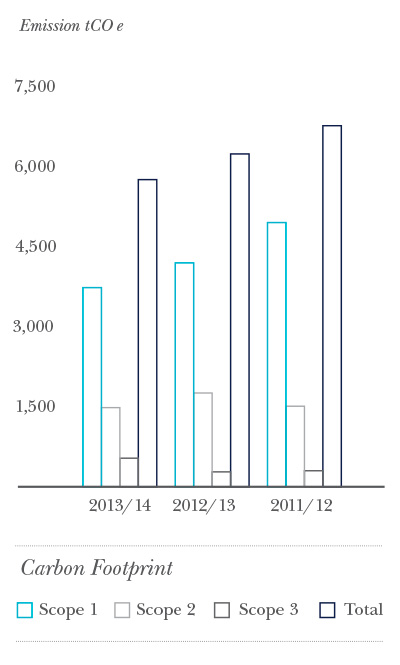
The direct GHG emissions from diesel used for company vehicles, delivery of brand new vehicles and other uses amounted to 2,511 tCO2e (2,914 tCO2e in 2012/13). This is 43% (47% in last year) of the company’s total carbon footprint.
DIMO’s GHG emission during the year under review was 0.2773 tCO2e per Rs.1 Mn of net turnover. This is in comparison to the last year’s figure of 0.2218 tCO2e. This increase is partially due to the reduction in turnover that did not result in a proportionate reduction in GHG emissions. There was a 7.7% reduction in the company’s carbon footprint. This is attributed to a reduction in diesel used for delivery vehicles and reduced electricity usage.
The company will continue to monitor its carbon footprint and ensure that there is a progressive reduction in years to come.
Atmospheric emissions are tested every three months. So far the company has ensured that its emissions levels are well below the level set by the Central Environmental Authority (CEA).
A comprehensive system of ‘gas’, and ‘dust’ extractors and filtration systems across all the company’s workshop sites ensure that emissions are kept within acceptable limits. Carbon dioxide and diesel fumes from our Mercedez Benz workshop are captured, stored and released in controlled volumes into the atmosphere. Exhaust and gas extractors capture emissions from engine testing and the cleaning of air filters and brake assemblies. Filtration systems in the company’s paint booths capture toxic fumes and particles, by-products of the ‘painting’ process.
The company uses a substantial quantity of materials for vehicle repairs, for after care of vehicles, and in providing various engineering solutions. This includes paints, kerosene, lubricants, re-threaded tyres, floor carpets, lacquer, thinner, putty and filler.
The company has in place processes to ensure that all materials used as part of the company’s activities are stored, used and then disposed of in line with the company’s comprehensive Environmental Management System. The company’s Materials Management System ensures that materials are recycled wherever possible. Those materials that cannot be re-cycled are disposed in a responsible way.
The company’s main sources of energy are electricity, diesel, petrol, and liquefied petroleum gas. The expenditure on energy is significant because of the nature of its business activities. Electricity is obtained mainly from the national grid. This is supplemented by the use of environmentally friendly ‘in-house’ generators.
Stringent processes measure and carefully manage energy consumption within the company. The cost of energy is a significant part of product and service costs, and has an important impact on the company’s bottom line.
Overall energy usage reduced by 13% over the past year. Diesel fuel usage for delivery of vehicles reduced by 20% and this had a significant impact on overall energy consumption. Stringent processes to monitor diesel usage were implemented during the year. Petrol consumption increased by 7% because of an increase in sales promotion activities. Electricity consumption decreased by 14%.
External and ‘in-house’ energy audits have identified a number of areas where the company can reduce energy usage. The use of capacitor banks for power factor correction, the replacement of incandescent lighting with CFL and LED lighting, programming all computers to revert to standby mode within a five- minute idling period, and the setting of air conditioning units at a constant minimum of 24 degrees Celsius or more, are some of the measures that were identified and measures the company implemented across all of its locations. The company is certified to conduct energy diagnoses and audits and is accredited by the Sri Lanka Sustainable Energy Authority.
Water is a primary and indispensable input for the vehicle service and repair business. In addition, water is used for other purposes at all location sites. The company continues to rely on the national supply for its water.
The company’s processes ensure the measurement, management and recycling of water used within the Group. Water optimization affects the company’s bottom line, and helps conserve a natural resource that is critical to society. Waste water is treated to comply with regulatory requirements before being released into the environment to ensure that there are no harmful effects to the community.
Water consumption decreased by 10.1 % over the past year. This was mainly due to a 15% decrease in water consumption at the company’s headquarters. 24% of the ground water consumed (21 % in FY 2012/13) has been recycled and reused. This amounts to 11% (11% in FY 2012/13) of the total water consumption.
The amount of water re-cycled increased because of an increase in capacity at the water treatment plant at Siyambalape. The total volume of water reused at Siyambalape and Weliveriya was 9,692 m³. Of this, 4,917m³ has been used for vehicle washing purposes whilst the balance was used for gardening purposes in both premises.
DIMO’s waste management processes prevent the discharge of untreated water into the sewage system. Waste water from all workshops pass through oil separators and are monitored to ascertain their pH levels, to ensure compliance with regulatory limits. All of the company’s workshop locations contain a state-of-the-art biological water treatment and recycling plant. Wherever possible water is recycled and re-used.
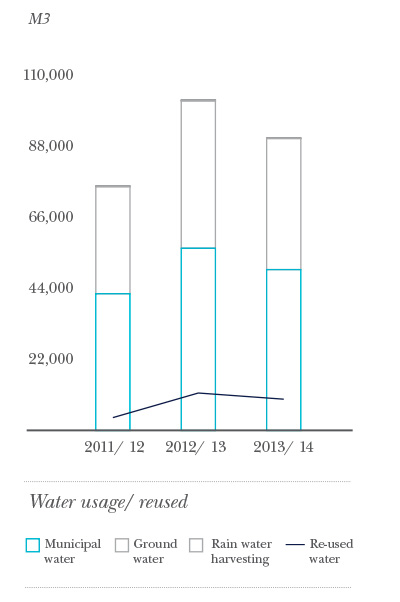
The company is subject to random independent checks by a CEA approved entity. Re-cycled water is checked randomly to ensure pH Value, Chemical Oxygen Demand (COD), Biochemical Oxygen Demand, Total Suspended Solids and Oil/Grease content levels are below the tolerance levels set by the CEA. The levels have always been found to be within the parameters of the CEA.
The measurement and management of effluents and waste is necessary as it helps the company evaluate the level of efficiency with which the service centres operate. It also helps the company ascertain how environmentally friendly it is. Being able to recycle and reuse helps keep costs down while mitigating the adverse impacts on the environment. Efficient waste management plays a pivotal role in adhering to environmental regulations and ensuring that the local communities where the company operates do not face any health hazards as a result of the company’s business activities.
The company’s systematised approach to effluent and waste segregation for non-hazardous solid waste, which forms part of the EMS, involves separating materials at source. Materials such as organic material, paper, plastic and polythene are classified so that management becomes easier and more efficient.
Colour coded bins are provided at all the company’s locations and waste is separated at source. Disposed food is given to a third party for use as animal feed. Last year 136,192 kilogrammes (134,536kg in 2012-13) of non-hazardous waste were handed over to CEA approved third parties for recycling or to be reused.
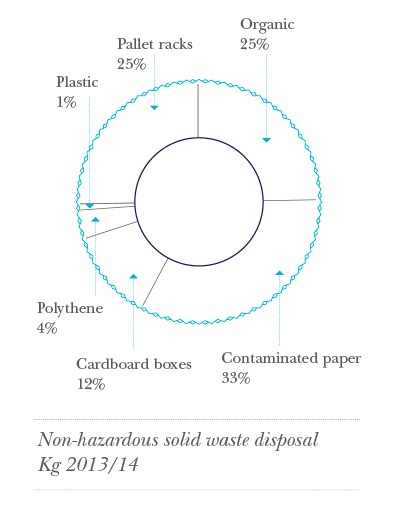
Hazardous waste is regularly handed over to designated third parties for recycling. This includes waste oil, thinner, sludge, mettle scraps, metal dust, paint cans, filters, batteries, tyres and saw dust. No chemical spillages have taken place at DIMO. Employees have been trained to respond promptly to chemical spillages, should they occur. Regular training is provided to employees on safety measures and the proper handling of materials.
During the year under review 125,153 kilograms (132,364 kg in 2012-13) and 107,646 litres, (105,506 litres in 2012-13) of hazardous waste items were handed over to CEA approved third parties for recycling/ to be re-used.
Noise emissions from all of the company’s facilities are strictly controlled to ensure that they do not cause discomfort to those in the vicinity. Noise levels are measured constantly by the Central Environmental Authority (CEA) to ensure that it remains within acceptable limits.
In order to pursue the company’s sustainability objectives to the maximum and to further integrate the sustainability ethos into all aspects of DIMO’s operations, the company began to explore the use of ‘Green Buildings’ at different locations within the Group.
The implementation of the green building concept began with the construction of the Bosch Service Centre at the Head Office premises in 2011. This facility, constructed as a ‘Green Building’ began commercial operations in January 2012. The LEED Gold Certificate was obtained for this building.
The recently completed Dimo 800 – Mercedes Benz Centre at Sirimavo Bandaranaike Mawatha, Colombo 14, was also constructed in line with the Green Building concept. The company expects to save approximately 25 % energy from the energy saving initiatives taken.
Turtle conservation at Panama
The objective of the turtle conservation project, carried out in partnership with the Environmental Foundation Limited (EFL), is to conserve marine turtles by restoring and rehabilitating their nesting habitats along the Panama coastal line in the Eastern Province.
A new agreement to continue the partnership for this project was signed on the 2nd of December 2013. The marine turtle monitoring and conservation program in the Komari-Panama area will be developed into a community-based turtle monitoring, conservation and education programme. Under the renewed agreement, as of now, 3570 hatchlings were released to the ocean and 88% of the eggs have successfully hatched.

Find out how our products and services play their role in the generation of sustainable value.
This section provides an overview of the “value creation activities” undertaken by each business segment together with their performance.
|
Year |
2008 |
2009 |
2010 |
2011 |
2012 |
2013 |
|
Class of vehicles |
|
|
|
|
|
|
|
Motor cars |
20,237 |
5,762 |
23,072 |
57,886 |
31,546 |
28,380 |
|
Three-wheelers |
44,804 |
37,364 |
85,648 |
138,426 |
98,815 |
83,673 |
|
Motor cycles |
155,952 |
135,421 |
204,811 |
253,331 |
192,284 |
169,280 |
|
Buses |
1,180 |
739 |
2,491 |
4,248 |
3,095 |
1,805 |
|
Dual purpose vehicles |
2,856 |
1,280 |
11,712 |
33,518 |
37,397 |
24,603 |
|
Goods transport vehicles |
14,038 |
8,225 |
11,845 |
14,818 |
12,266 |
5,872 |
|
Land vehicle |
26,132 |
15,284 |
19,664 |
23,194 |
21,892 |
13,038 |
|
TOTAL |
265,199 |
204,075 |
359,243 |
525,421 |
397,295 |
326,651 |
Source: Department of Motor Traffic
DIMO uses monetised and non-monetised capitals to generate significant outputs and outcomes for company, stakeholders and environment. In 2013 DIMO continued to deploy its supply chain process to generate value in a number of key areas. The company’s core activities - sourcing, warehousing, marketing, solution mapping, engineering, delivery and after sales care – were the primary contributors to value generation. These core areas were supported by interventions in the financial and commercial services, in IT, marketing and human resource management. The company’s capital deployed in these core areas and support services, helped in the process of value creation and in growing both monetised and non-monetised capital.
A key part of our portfolio is the vehicle segment. From high-end luxury brands to hardworking commercial vehicles, we deliver a range of passenger, four-wheel drive, commercial and special purpose vehicles that serve Sri Lankans from every part of the island.

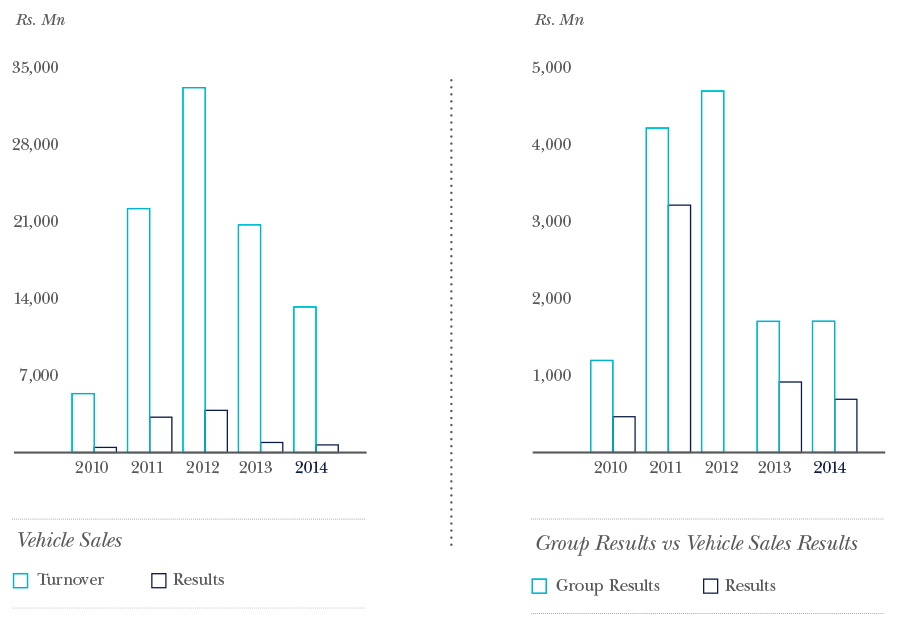
The sale and the after care of passenger, commercial vehicles and off-road vehicles is one of the company’s core activities. The company markets a range of vehicles which include Mercedes Benz, Tata, Chrysler - Jeep, Mahindra tractors and Claas machines. The company’s overall performance is influenced significantly by how this segment performs.
There was a decrease in the total number of vehicle registrations in 2013 by 18% (a 24% decrease in 2012). Car registrations decreased by 10%, buses by 42%, three-wheelers by 15%, land vehicles by 40% and ‘goods transport vehicles’ by as much as 52%.
Import tariff and interest rates have a critical bearing on the growth of the automobile market in Sri Lanka. An enhanced duty structure on vehicles has curtailed demand over the past two years. On the other hand the commercial vehicle business is highly dependent on the prevailing interest-rate regime. Most of these vehicles are purchased through lease agreements or from commercial borrowings.
Borrowing and lending rates dropped in 2013/14 although the expected increase in demand did not occur.
The ‘DIMO Batta’, which the company started marketing in 2006 has transformed the lives of thousands of Sri Lankan entrepreneurs. It has provided a variety of entrepreneurs with a low cost and functional vehicle that serves multiples purposes. During the year the company sold 10,375 units out of which 6,772 were DIMO Battas.
43 showrooms in all parts of the country showcase the company’s vehicles. Innovations such as a ‘twenty-four hour roadside assistance service’, Adhisathkara and Gamin Gamata have ensured that customers are provided with the highest levels of after sales care.
|
Vehicle sales -segment |
2013/14 |
2012/13 |
Segment Turnover (Rs. mn) |
13,262 |
20,736 |
% Contribution to the Group Turnover |
64% |
75% |
Segment Result (Rs. mn) |
692 |
916 |
% Contribution to the Group Segment Result |
41% |
54% |
Segment Capital employed(Rs.mn) |
4,028 |
3,740 |
Weighted average customer satisfaction index |
90% |
91% |
|
No of vehicles sold by Dimo |
10,375 |
14,199 |
The company anticipates that the heavy investments earmarked for infrastructure and roads over the next few years and a lower interest rate regime will stimulate a healthy growth in this sector. DIMO stands ready to capitalize on this opportunity.
Principals represented

World-class accessories and components are simply part of our renowned after care service package. DIMO also serves our customers through our state-of-the-art Mercedes Benz Centre and the LEED Gold certified BOSCH Diesel Centre and Car Service Centre, offering industry expertise, state of the art diagnostic equipment and access to best-in-class automobile engineering services.
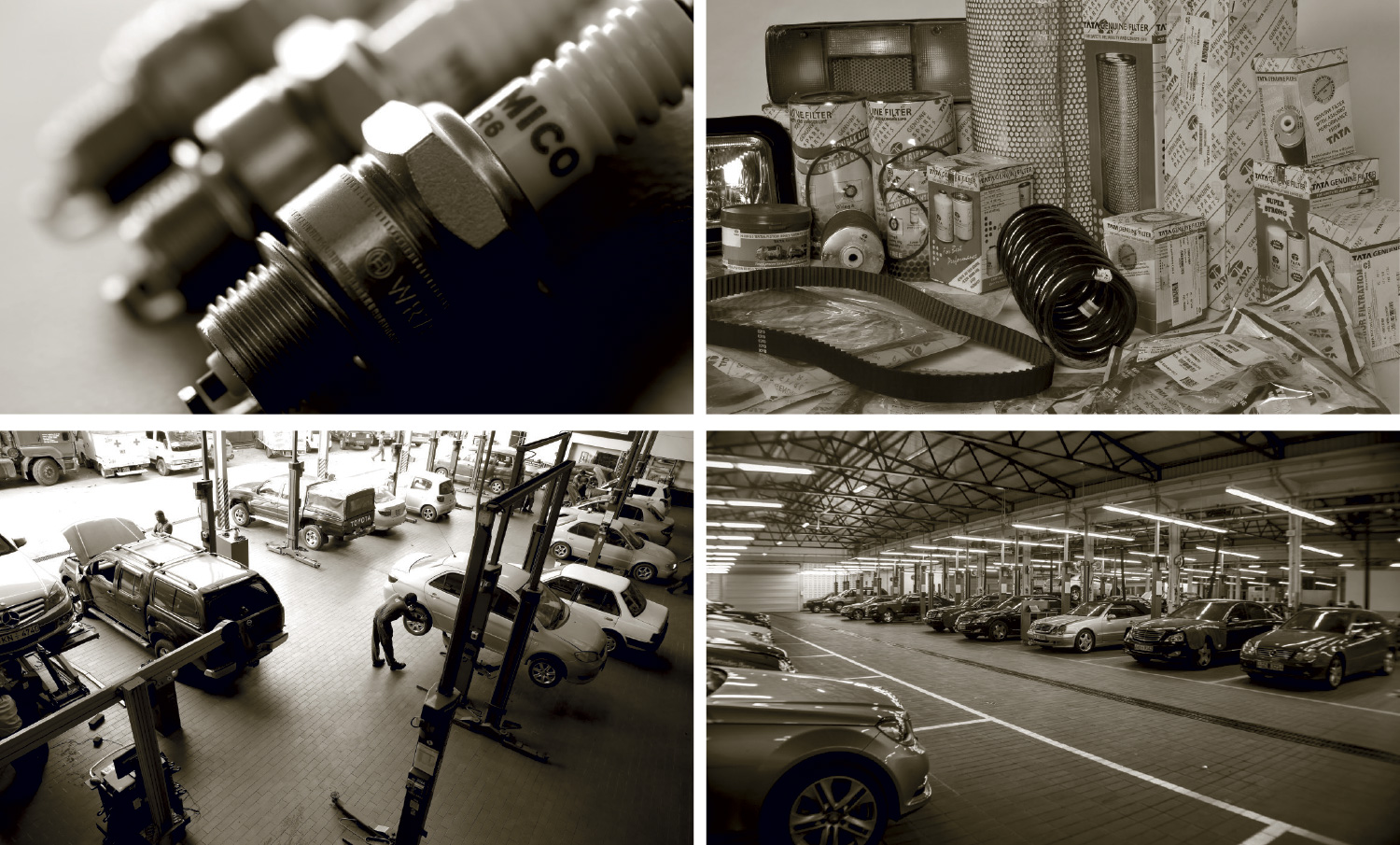
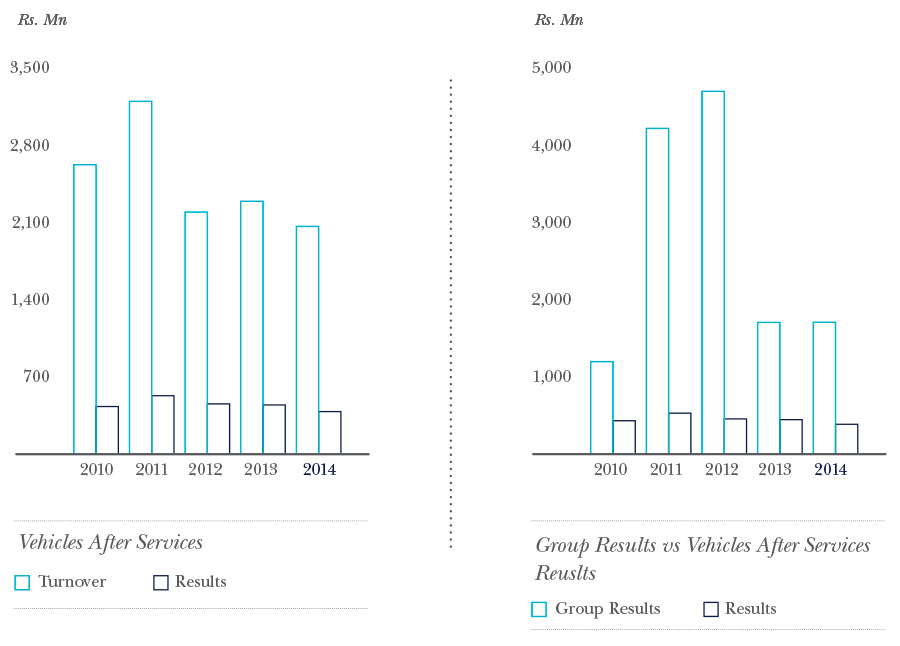
The state-of-the-art Mercedes Benz service centre that opened in 2014 will transform ‘after sales care’ offered by the company. It will complement the services offered by the Bosch Centre, which DIMO opened two years ago. During 2014 the company will relocate the Tata passenger vehicle service centre to its headquarters. This will be accompanied by a re-organisation of the Tata service dealer network and a strengthening of service capacity.
Apart from providing ‘after sales care’ for Mercedes Benz, Chrysler - Jeep, Tata vehicles and Mahindra tractors, DIMO also holds the franchise for spare parts for these vehicles and has a country-wide distribution network. Spare parts for these brands of vehicles and tractors are made available through 21 distribution centres in different parts of the country.
Vehicle after care today requires the intensive use of state-of-the-art technology. DIMO has invested heavily in training technically sound and technologically advanced engineers over the years. It has placed strong emphasis on maximizing the benefits of modern technology for vehicle after care and on carving a niche as a technological leader. An elaborate training structure and an ‘in-house’ training centre ensure the constant availability of well-equipped engineers with the capacity to understand diagnostic issues and advise on effective solutions. The use of electronic and on-line catalogues has added value to our supply chain in this segment.
The new state-of-the-art workshop at the Mercedes Centre will significantly improve workshop capacity, providing a boost to the revenue streams from this segment. Relocation of the Tata passenger car workshop too will help to improve its capacity and revenue. Overall this segment is expected to record a much improved performance.
|
Vehicle after sales-segment |
2013/14 |
2012/13 |
Segment Turnover (Rs. mn) |
2,067 |
2,294 |
% Contribution to the Group Turnover |
10% |
8% |
Segment Result (Rs. mn) |
386 |
445 |
% Contribution to the Group Segment Result |
23% |
26% |
Segment Capital employed(Rs.mn) |
1,429 |
1,251 |
|
Weighted average customer satisfaction index |
85% |
77% |
|
Workshop throughput – No. of vehicles |
7,451 |
7,504 |
Principals represented

The Marketing & Distribution sector is a broad one, delivering total solutions in tyres, auto components, power tools and lighting products from a range of global brands. Top quality product technology combined with highly trained personnel make us outstanding in these industry segments.
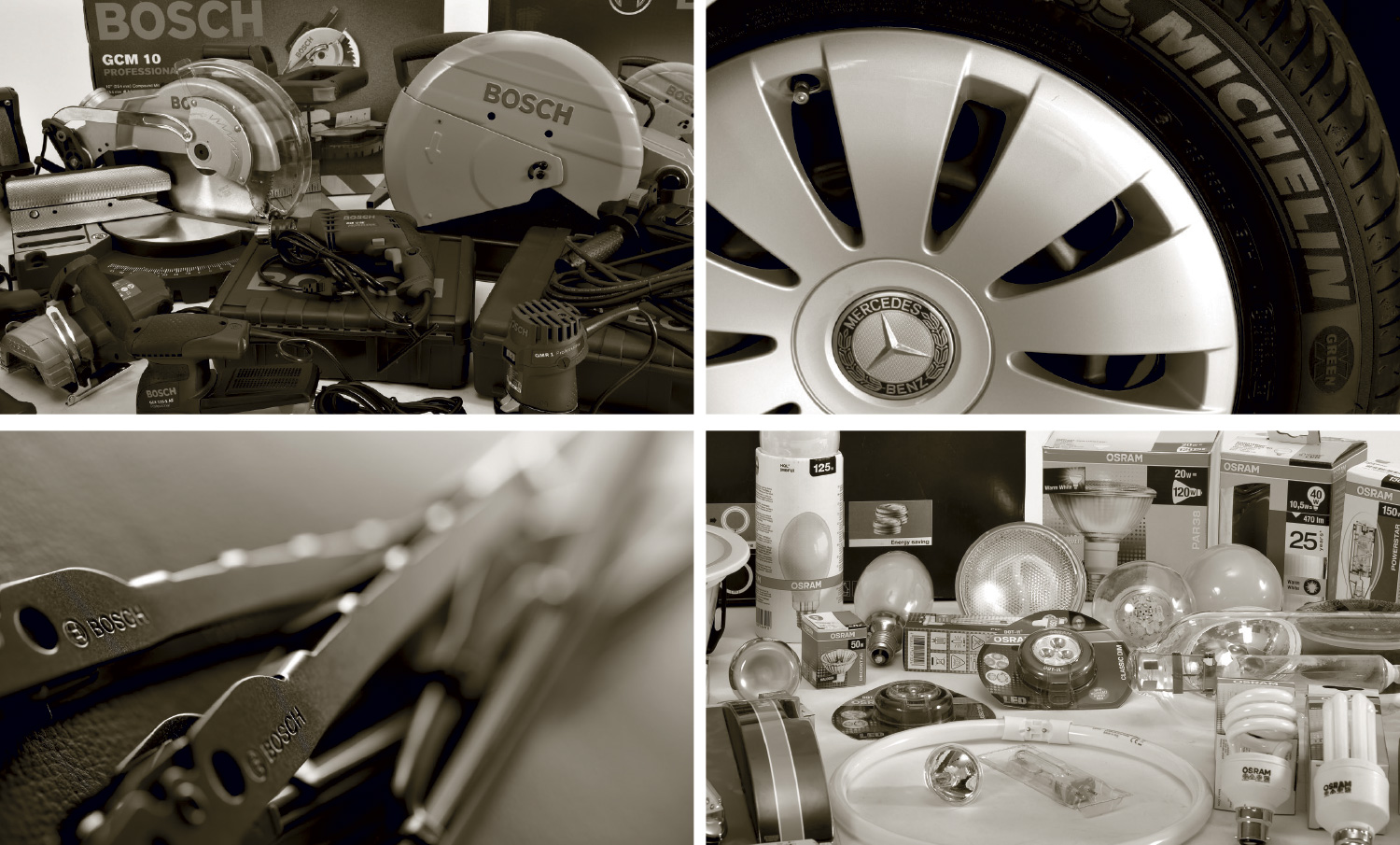
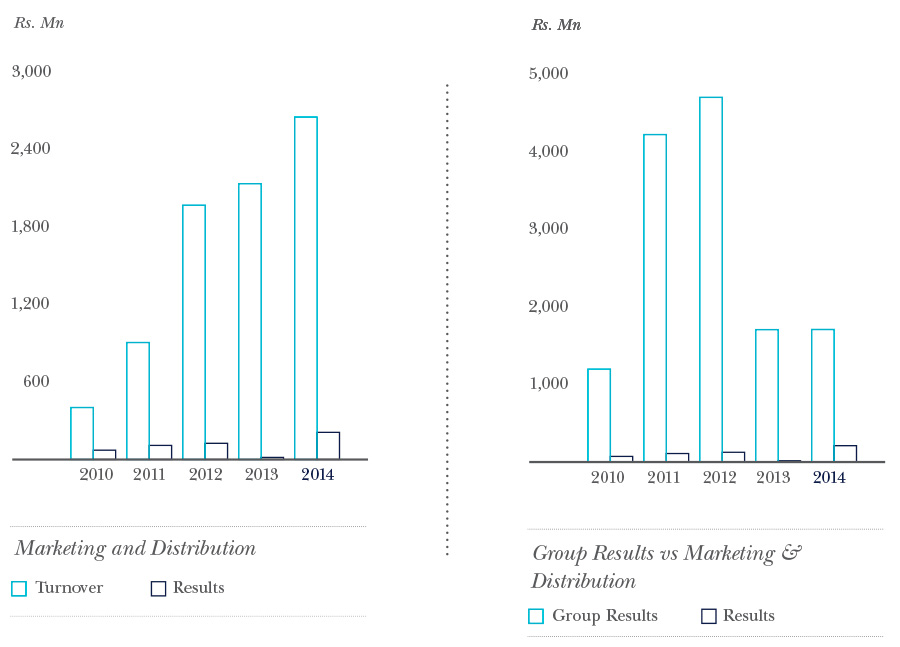
The Marketing and Distribution segment of DIMO’s operations markets a range of quality products that include tyres, modern lighting products, power tools, original equipment for vehicles (OE) and Bosch auto components. These products are distributed mainly through a country-wide network of distributors and dealers. Key aspects driving performance in this segment are a reliable marketing strategy, strong execution of this strategy, and the effective management of the inventory and receivables. Sourcing quality products, warehousing them and prompt delivery play an important part in the supply chain of this segment. The company uses the logistics centre at Weliveriya as its main warehouse to supply agents throughout the country.
Marketing & distribution segment considerably improved its contribution to the segment result with the Original equipment (OE) business being a major contributor. Power tools business too performed exceptionally well to record the highest ever profit to come from its operations. Power tools accessories sales remained the market leader in the branded products segment. Tyre retailing is being considered as a strategy for market penetration and the company recently opened a retail outlet in Wattala taking the first step in this direction.
|
Marketing and Distribution -segment |
2013/14 |
2012/13 |
Segment Turnover (Rs. mn) |
2,650 |
2,134 |
% Contribution to the Group Turnover |
13% |
8% |
Segment Result (Rs. mn) |
209 |
15 |
% Contribution to the Group Segment Result |
12% |
1% |
Segment Capital employed(Rs.mn |
1,505 |
1,132 |
|
Weighted average customer satisfaction index |
86% |
87% |
Segment Receivables – (Rs. Mn) |
817 |
452 |
|
Segment Inventory – (Rs. mn) |
511 |
566 |
The construction sector boom has given an impetus to the lighting and power tools businesses. Plans are afoot to add two more product ranges, which will boost the segment turnover. The growth momentum experienced in the tyre business in the second half of the year is expected to continue during the ensuing year. In order to improve competitiveness, strengthening of the distribution network will receive special focus. The budgets indicate that Bosch and Original Equipment (OE) business will enhance the contribution to segment result. Overall, a much improved performance is expected from this segment.
Principals represented

Sri Lankans all over the island now have access to state-of-the-art technology in construction and mining equipment.
DIMO also offers a range of after-market support services, company certified implements and original components.
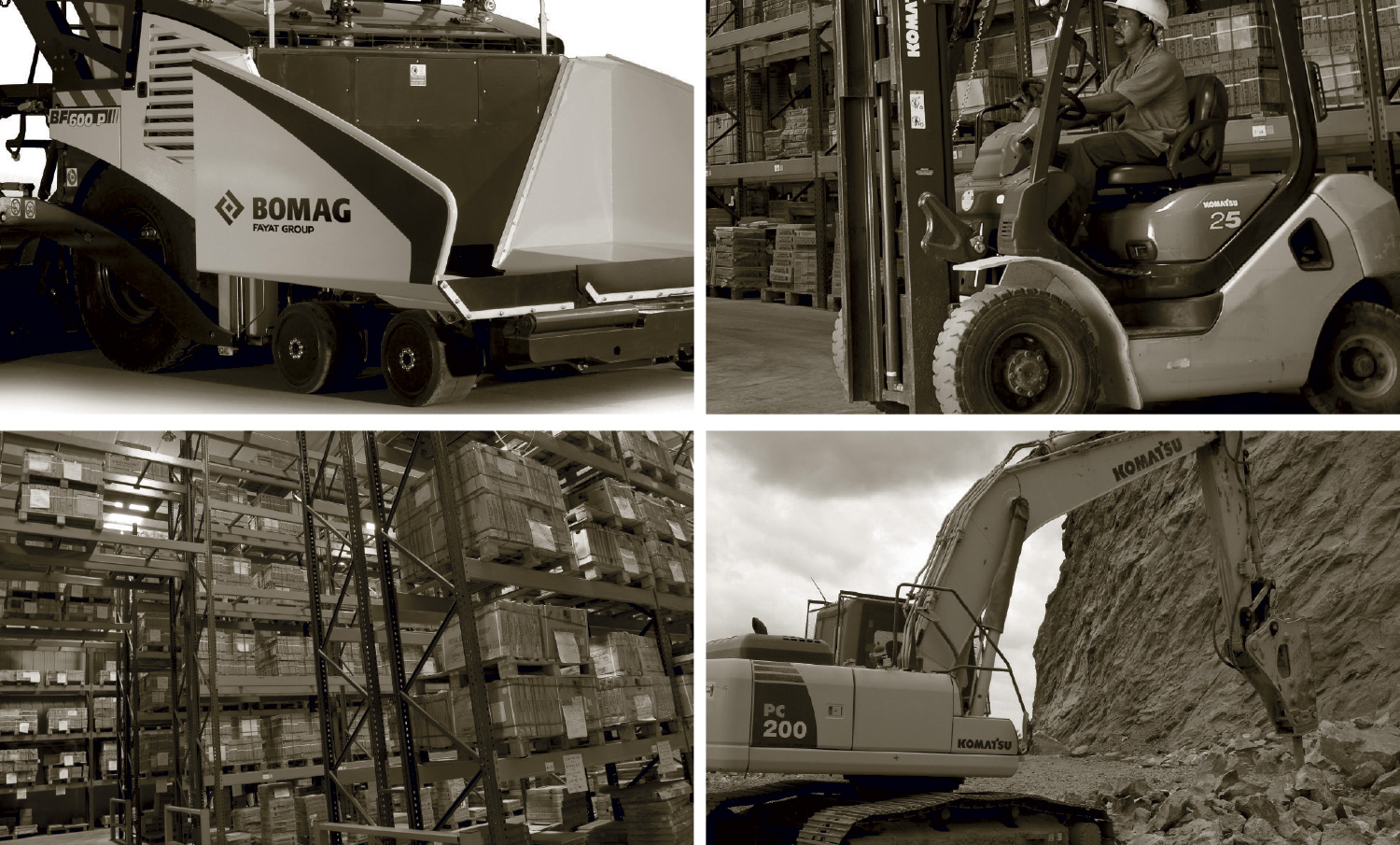
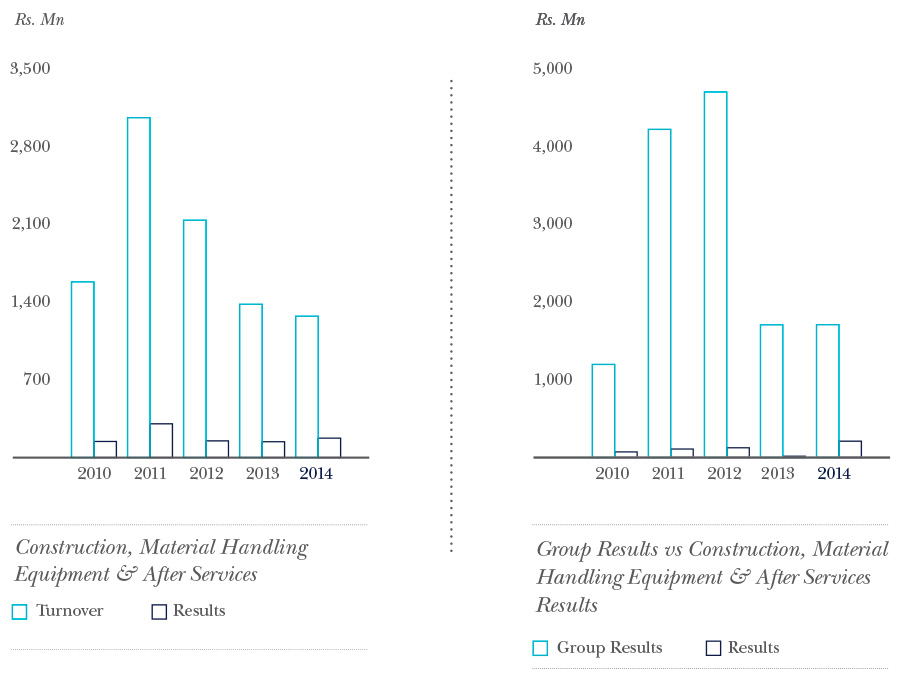
DIMO provides a range of solutions for infrastructure development and the construction industry. Bulldozers, rollers and compressors and more specialized machinery such as pavers and cranes provide a ‘one stop shop’ for those engaged in road construction. Warehousing solutions such as racking systems, material handling equipment, storage management systems and automated car parking systems are designed for another group of entrepreneurs. The company provides full maintenance contracts with the equipment it markets, providing added value to customers. The warehousing solutions are unique and include the full spectrum of services from design to supply and commissioning of a fully functional state-of-the-art warehouse. This segment of the company’s operations was buoyed by the momentum of the country’s construction sector. “BOMAG” asphalt pavers, “KAESER” compressors, LEEBOY backhoe loaders, “GEHL” skid steer loaders and “PALFINGER” truck mounted cranes were introduced to the product portfolio of this segment during the year.
|
Construction Material Handling Equipment and Services |
2013/14 |
2012/13 |
|
Segment Turnover (Rs. mn) |
1,273 |
1,381 |
% Contribution to the Group Turnover |
6% |
5% |
Segment Result (Rs. mn) |
174 |
142 |
% Contribution to the Group Segment Result |
10% |
8% |
Segment Capital employed (Rs.mn) |
579 |
492 |
Weighted average customer satisfaction index |
90% |
86% |
|
Contribution of full maintenance contracts to the segment result |
32.75% |
42.25% |
Strong public sector investments in highways, railroads, and port development will present this segment with more business opportunities. This momentum is likely to be maintained and the company will continue to support the development of a robust infrastructure, housing and the tourism industry for Sri Lanka at the same time creating value for DIMO.
Principals represented

This segment is possibly our widest, including building automation systems, fire detection, protection and suppression systems, CCTV and access control systems, public address systems, power systems for marine propulsion and rail traction. Industrial refrigeration and medical equipment.
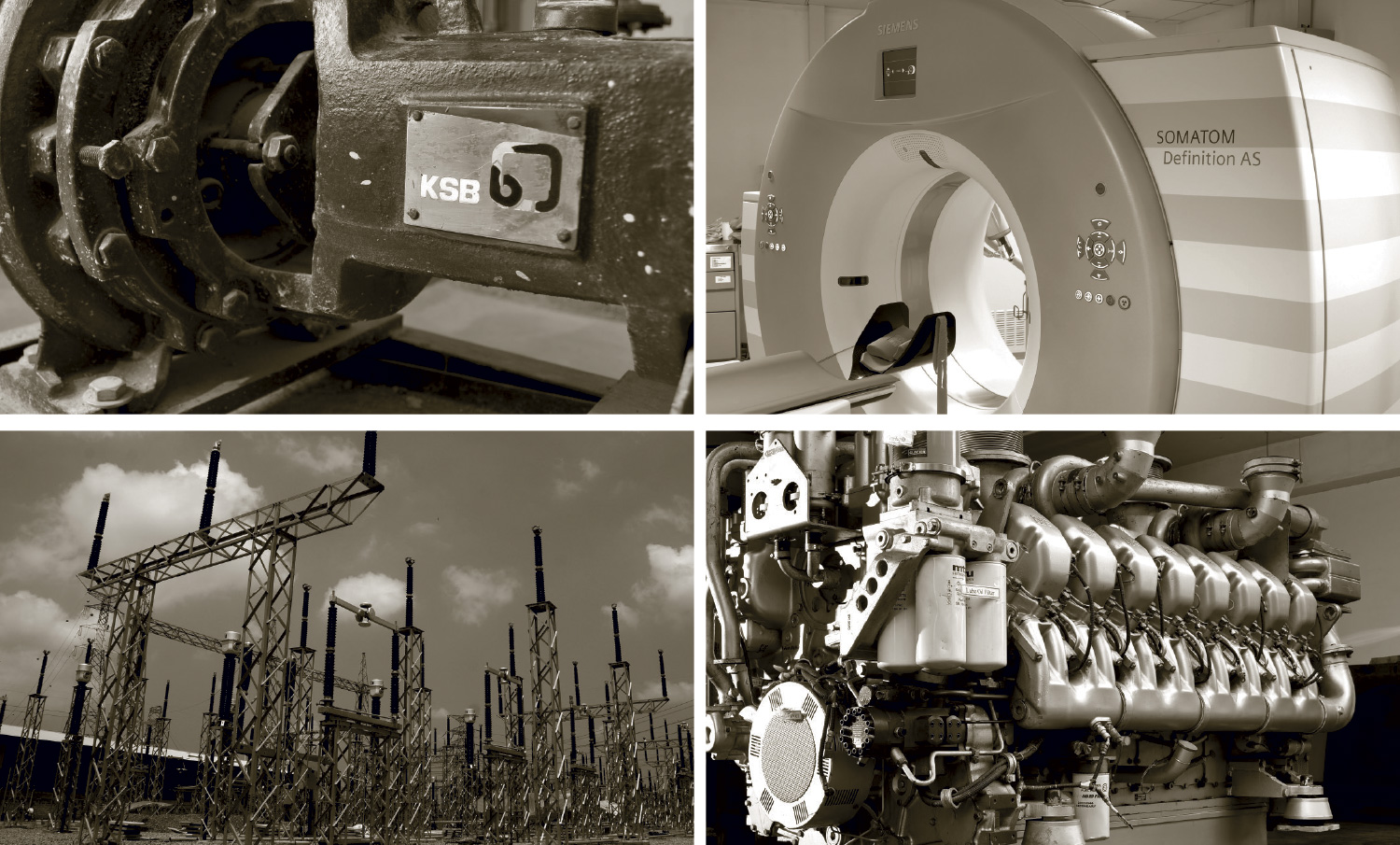
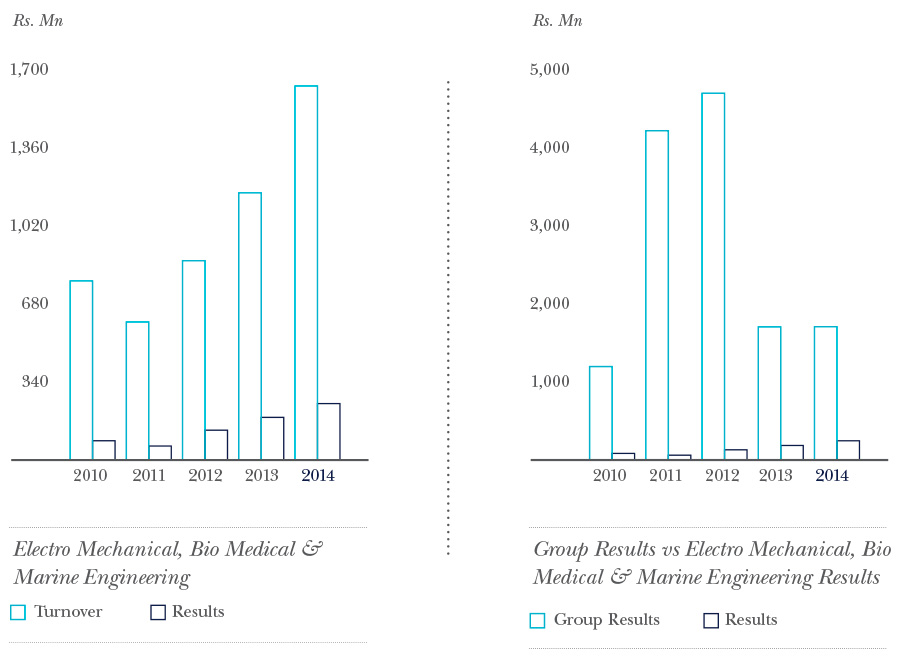
This is a segment that has seen a rapid expansion in the recent years in scope and in size. The Electro - Mechanical Engineering business includes many building services such as fire detection and protection systems, building technologies, security and electrical engineering solutions and services including transmission and distribution. This is an area where total solutions are offered to the customer upon understanding their requirement. The Bio Medical Engineering business deals with state of the art equipment in diagnosis, therapy, ophthalmology and critical care. Therefore, our solution extends to designing, supplying, commissioning and after service of the solution proposed. The Marine solutions business is mainly engaged in areas related to repair of ships and marine craft. Solution mapping, engineering and after service are critical activities in the supply chain of this segment. The Bio-Medical Engineering business was the top performer of this segment. State of the art diagnostic equipment such as high- end MRI and CT scanners were installed and commissioned by the engineers of the DIMO tribe. During the year under review, the first tomotherapy unit in Sri Lanka was imported and supplied by DIMO. The building technologies business was active in the private sector and public sector projects and made a significant contribution to the segment result. The Power Engineering business too made its contribution to the development of the power sector, whilst creating value for DIMO.
|
Electro Mechanical , Bio Medical and Marine Engineering |
2013/14 |
2012/13 |
Segment Turnover (Rs. mn) |
1,630 |
1,165 |
% Contribution to the Group Turnover |
8% |
4% |
Segment Result (Rs. mn) |
245 |
186 |
% Contribution to the Group Segment Result |
14% |
11% |
|
Capital employed |
1,494 |
1,034 |
|
Weighted average customer satisfaction index |
88% |
88% |
Sri Lanka is in a phase of the economy where spending in construction industry, power generation and transmission and healthcare is rapidly increasing. This significantly enhances the prospects of this segment. We also note the encouragingly consistent growth recorded in this segment. This is a key area that is expected to be developed in the short and medium term in our endeavour to reduce dependence on the auto related segments. The budgets indicate a further improved performance in 2014/15.
Principals represented
